#i really like the irony of one of the most powerful beings on the continent who specializes in illusion magic
Explore tagged Tumblr posts
Text



So, like,
is the implication that he can't see the 3D optical illusion
because one of his eyes is a gemstone?
#that's so fucking funny if true#i really like the irony of one of the most powerful beings on the continent who specializes in illusion magic#just having a complete blind spot for simple novelty parlor tricks#nu carnival#nu carnival kuya#main story reread
158 notes
·
View notes
Photo
Also, like Cersei Lannister, she wanted to marry an emo Dragon guy, except he hooked up first with a woman from the desert culture, and hates one of her brothers, while the brother closer to her age is kind of a twit.
On the other hand, Elayne is like the avatar of responsible government in WoT, which makes her the complete opposite of a Lannister. If WoT has a Lannister equivalent family, it would be the Damodreds, whose selfish hunger for power and inability to handle rejection results in their country being devastated by a really brutal war with the apocalypse looming. The best member of their family is a diminutive schemer and probable member of a trio of heroes who will save the world by wielding dragon-power at the heart of the evil threat in the far north. However, this hero has a long way to go in overcoming the toxic attitudes instilled by an upbringing in one of the worst families on the continent. (I am referring to Moiraine & Tyrion, for the unread or wool-headed out there) The irony of course, is that Elayne is nothing like any Damodred, despite being the daughter of one, and, in fact, her not being a Damodred, despite her paternity, is likely to be a considerable source of support for her claim to the throne they once held.
The quote about paying debts is also more of a contrast than a comparison. While the Lannisters frequently boast of paying debts, more often than not, it is self-congratulatory hype of a simple maintenance of a patronage arrangement. Mostly it refers to their bitter, spiteful and vindictive nature, when nobles are supposed to be above all that sort of thing (and all the main Lannister characters certainly affect that position, while being blatantly false for each of Tywin, Jaime & Cersei). Beyond exacting excessive revenge for minor setbacks or defeats that should be accepted impersonally, we see, in fact, that the Lannisters do not pay their debts, and are constantly refusing or rationalizing away their debts.
Meanwhile, Elayne's quote about paying her debts is spoken in response to her rather obtuse companion, Sareitha, who perceives an obligation of patronage that Elayne knows is completely false. "Doilan Mellar" saving Elayne's life was so obviously a setup and a ruse to gain her trust that neither Elayne, nor her three closest friends felt the need to comment on it when she heard the report of the incident. When Sareitha, not for the first time, fails to discern what is obvious to Elayne's eyes, and remonstrates with Elayne for pointing out "Mellar's" failures of duty and political misjudgment, Elayne says she pays her debts, meaning, in the case of Mellar, there is no debt as Sareitha thinks, and, in fact, her treatment of him is the least of what he deserves. Further, she fully intends to repay the debt of justice that Hanlon has incurred. Justice, of course, is a concept with which the Lannisters have only the most vague acquaintance.
It's also interesting how, while Elayne was born to as much privilege as the Lannisters, allowing for the different settings, she responded by accepting the burden of responsibility, and even when stripped of many of the advantages she had been raised to expect, made the most of what resources she did have, while upholding her ideals and morals, rather than using the desperation of her circumstances as an excuse to commit war crimes or acts of tyranny. And a not-insubstantial portion of the fandom scorns the story of her rise to power as the boring tale of an entitled princess who does nothing but take baths.
Meanwhile, Tywin Lannister was born the heir to the wealthiest family and greatest income in the realm, ruling over lands that had one of the largest population bases, giving him access to one of the strongest military forces in the nation. As was said about George Steinbrenner, he was born on third base, but [much of the fandom] acts like he hit a triple. Tywin retains his considerable birth advantages throughout his life. Though his parental influences were not up to the standards Elayne had, he was, as a small child, taken to be raised in the court of arguably the most benevolent monarch in the setting, much like Elayne herself. But where Elayne collects friends everywhere she goes, and is often the glue holding fractious groups together with her diplomacy, Tywin seems to excel at alienating anyone who might be an advantageous ally. He grew up best friends with the crown prince of the realm, only to destroy that relationship with his pride and self-aggrandizing nature. When the princess of Dorne shows up at his door in a visit pre-arranged by Tywin's recently deceased wife, instead of taking the opportunity to make an alliance with another powerful family, he does everything to insult them indirectly and squelch the relationship his wife had sought to cultivate between their families. The referenced efforts to make a marriage alliance with House Tully seem to have been more focused on finding a womb to give him grandchildren, as once King Aerys takes Tywin's son off the marriage market, there is no mention of any follow-up efforts to use one of Tywin's numerous nieces, nephews or cousins to make the alliance happen.
At the beginning of the series Tywin starts a war alone, without allies, and wins a few early victories through a great deal of luck and extenuating circumstances keeping most of his enemies distracted. He then proceeds to get his ass kicked around the region by a teenager fighting his first war, manages to lose a battle to Edmure "Fredo" Tully, and authorial interference turns that into good luck for Tywin. Elayne says at the outbreak of her own war of succession that the best she can hope for is that the enemies in the field against her (whom her strongest and most plugged-in ally, Dyelin, assured her would not take the field) fight each other first. This does not happen, because she is a protagonist, not written by Amazon or Disney staff hacks. Instead, all her rivals unite against her. Meanwhile, Tywin, in a situation where anyone with brains would be telling him he is an idiot who is marching into a situation that is begging for every hand to join against his House, instead lucks into all his rivals for power attacking each other, despite their sole common shared interest being the elimination of Tywin and the Lannisters. Elayne, in a situation where her enemies should have been fighting each other, has to overcome them cooperating, while Tywin, in a situation where he should have been public enemy number one, gets to escape the consequences of his blunders and brutality because the Greyjoys attack the Starks, the Valemen abandon the Riverlands, and the Baratheons fight each other, when Tywin's grandson was a more important, and closer, target. Not one of those outcomes should have been expected, and Tywin did not lift a finger to make any of them come to pass.
And yet, he has a reputation as a brilliant Machiavellian politician and strategist, whose family only fails because he is unexpectedly killed and they are deprived of his leadership. In truth, they failed, because Tywin deprived their family of allies with his arrogance and greed, before being forced to depend on equally greedy and treacherous allies, who are only interested in what they can squeeze out of the Lannister regime, and his brutality has given half the continent a direct motivation for revenge.
Tywin gets a lot of credit for the peace and prosperity of the realm when he was Hand, but a lot of that had to do with the lack of natural disasters or bad weather that undercuts a medieval economy, and the defeat in the previous reign of the last significant external foe. The major domestic crisis during the Handship of Tywin was one of either his own instigation or his mishandling of a dispute and he was saved from a disaster by the heroism of one man, whom he did nothing to help. Neither Tywin, nor his children, see any sort of responsibility to their subjects, while that is a constant with Elayne, from her empathy for the sufferings of the people of a country she passes in her travels, to the advice she offers Rand in Tear, her remonstrance against the ignorant Panarch of Tarabon, her (excessive, according to her common-born, healing-vocation, partner) charity to those she encounters along the way, up to her canvassing the commoners on her journey to Caemlyn. When her main military adviser wants to arrest a man they all but know is a traitor, she refuses on the grounds of his civil rights. The best you can say about the Lannisters on this score is that Jaime, in certain conditions, opposes the mass murder of the innocent population of a city, and Tyrion would prefer not to do such things if it's not convenient and the people in question have not pissed him off recently, or had the audacity to live under lords who have pissed him off. Elayne wants to establish a mail service, patronizes a school and makes a deal to obtain magic healing and transportation for her country. The closest thing to a public works project any Lannister contemplates are military defenses to retain their usurped power and various spite-inspired ideas of Cersei, largely for Lannister aggrandizement. Like cutting down a unique tree that is a symbol of an important international relationship to build a self-promoting throne...
Even simpler, where Robert Jordan chooses fertility as a theme of Elayne's political storyline, George RR Martin's favorite image to associate with Tywin, is shit.
That being said, the OP's art is very nice.

Elayne Lannister by merriya
“Elayne used to come across to me as a bit of a Lannister, the red and gold, the hair, ambitions for the throne, the lion sigil and all. Then I read her line “I always pay my debts” in Crossroads of Twilight… yeah, so I’m quite convinced she’s an alternate reality Lannister”
121 notes
·
View notes
Note
You’re welcome lol! It really opens up plenty of possibilities and a lot of the lore makes more sense when you see it that way, it’s super exciting to think about! Like, it wouldn’t surprise me if part (or maybe all?) of the Elites came from there, so maybe Dimitri, Felix and Sylvain actually have Sreng ancestors? (oh the irony!) Also iirc the devs said that they took inspiration from Gaul for ancient Faerghus and Italy for Adrestia, so I think what happened to that part of the continent (1/2)
follows the same dynamic: they got assimilated by the Empire and their culture totally changed to follow the Church of Seiros, to the point where their original culture was almost completely erased (good ol’ colonialism). The ultimate irony is that they are now the part of Fodlan most loyal to the CoS and that the Empire comes back again to destroy the culture they don’t like even though they are the ones who imposed it in the first place! (2/2)
I've definitely toyed with that thought a lot, but I think it would be so . . . SO incredibly messy if Blaiddyd, Fraldarius, and Gautier specifically came from the territories that would become theirs later.
If we're assuming all of this was Sreng pre-War of Heroes (islands are debatable?):
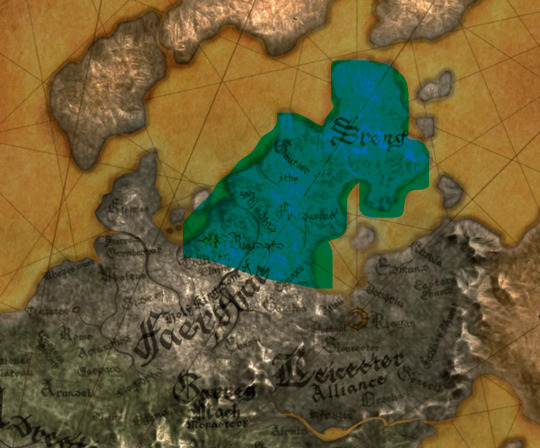
That would mean the people of Sreng willingly slaughtered Fódlani natives (Nabateans), which they'd have no real reason to do outside a power grab, and one that would be a lot less sympathetic than their current efforts to secure life-sustaining resources (that, according to this theory, were once theirs). Seems like a bad choice on Blaiddyd's, Fraldarius', and Gautier's end. I think it'd be more likely that they came from in and around Faerghus, and got their asses handed to them in the War of Heroes. The Empire establishes, for the lack of a less disheartening word, Fódlan's borders, pushing Sreng back past the mountains. People eventually settle in all corners of Fódlan; 750-odd years down the line Loog leads the rebellion and helps found Faerghus; a hundred or so years after that, Sreng gets sick of living in what's basically a wasteland and tries to get back to what was once their land, except now it's not the people that kicked them out living there, but (at least for the most part) other people entirely.
I would say the one complication with this is that it's "houses" that are allied with Nemesis, so I wonder if those changed places post-war? Like the Houses were outside the Srengi border/closer to Garreg Mach than they are now, and once the Empire won the houses got shuffled around into now-Fódlan territory. I don't know if this makes sense, but--oh well gldkgjdf.
I wonder if Sreng's different clans are a result of people from all across now-Faerghus being condensed into once space? Like if you were condense all of Faerghus into the size of Blaiddyd, you'd have a collection of different practices/beliefs even in one country. Food for thought, definitely.
16 notes
·
View notes
Text
Before the Wall part 56
Masterlist
A/N: We're so close to the end, guys!!! I can't believe this is almost done.
----
The dinner has been going on for over two hours already. It is a formal event, with everyone dressed in their finery, even though there are only four people in attendance.
Nakia’s chosen successor, a woman named Zarina, died in battle three weeks ago, and now that Nakia has chosen a new successor, tradition demands that she introduce the woman to her fellow queens. She announced her choice yesterday, and now, for the five following evenings, her and her chosen heir will dine with each of the other queens in turn. With Angolere being one of the most influential human countries alongside Scythia, it is Andromache the first dinner is held with. She was allowed to bring one companion, and as her own successor, Ania, is busy elsewhere, she chose Mor.
The dinner has been a tense affair so far, though more because of the nature of the meeting than because of the company. It’s meant as an opportunity for Andromache to get to know Elmira, Nakia’s successor, and so the conversation is more of an interrogation.
“And how do you feel about the treaty for after the war we are currently working on?” Andromache asks between bites of her dessert.
Elmira shifts a bit in her seat, whether from a show of nerves or restlessness, Andromache cannot tell. Either way, diplomacy isn’t her greatest strength, as Andromache has been quick to notice. It isn’t necessarily a problem – Scythia’s main role within the human realms is traditionally a military one – but it is of concern to Andromache, whose country is far more involved in foreign relations. She needs to know how well she will be able to work with Elmira, especially since the younger woman seemed rather brash even if she tries to hide it.
“I am unsure,” Elmira says. “There are many good things about it, but I’m other parts worry me. For example, I am in favour of the freed humans being granted territories of their own, but I worry about them being so far away from each other. Our countries all border each other, but these new countries, while relatively big, will be scattered throughout Fae territory. Should they be attacked, getting help to them will be difficult.”
Andromache nods. That has been a common cause of worry amongst the human leadership, and it makes sense for someone as involved in the military as Elmira to bring it up. “And what would you propose instead?”
Elmira hesitates. Very clearly swallows the reply she had on the tip of her tongue and instead says, “I have no viable alternative, I am afraid. It’s just something we will have to keep in mind, but I don’t like how this leaves us at the mercy of the Fae.”
“A valid concern,” Andromache says. “Ideally, human and Fae countries are supposed to grow together more closely over the next years through trade and diplomatic relations.”
“I’ll believe that when I see it,” Elmira mutters. Nakia shoots her a disapproving look and she quickly adds, “I mean, it’s not necessarily a bad idea, just very optimistic? Don’t get me wrong, I have worked with Fae in the cavalry, and they aren’t all horrible, but it’s the Loyalists who worry me.”
“We’ll certainly have to remain on our guard,” Andromache concedes. Elmira makes good points, although Andromache probably wouldn’t take her along the Alliance meetings anytime soon. “What would you suggest as possible precautions we might take?”
From there on, the conversation continues in the same manner for about half an hour. Elmira does a good enough job. She raises many valid concerns, although she tends to miss out on nuances and the reasons why certain ideas are not viable, but she always listens when Andromache corrects her, which is the important thing here. Being wrong is no problem – insisting on an opinion after having been proven wrong would be.
As the dessert is being cleared away, Elmira takes her leave so that Andromache and Nakia can discuss the meeting in private. Mor is about to leave as well, but Nakia motions for her to remain seated.
“Stay,” she says. “I have another subject to discuss with Andromache, and your input might be needed.” Mor sits back down, and Nakia turns to Andromache. “What do you think?”
“She’s talented enough,” Andromache says. “A good leader, from what I hear, and she already seems to have more talent at military strategy than me.” Elmira spent the last few years of war leading one of the flanks of Nakia’s cavalry and made quite a name for herself doing it. “She’s a bit too brash, but given time, I’m sure she will grow out of it.”
Elmira is not necessarily the choice she would have expected Nakia to make – too wild, too young, for the other queen’s taste – but Andromache has no concerns that would be major enough to withhold consent.
“If you want to choose her, you have my blessing,” she says. “But Nakia, are you sure you want to leave your country to someone this young? She’s only twenty-five.”
“I don’t exactly plan on dying tomorrow,” Nakia replies dryly. “Besides, Elmira is fully qualified. She studied and served her time in the army.” She picks up a cup of tea and takes a sip before glancing at Andromache again. “And twenty-five is the age you were when the war began, Andromache.”
Andromache sighs. She knows this and certainly doesn’t want to imply that Elmira is incompetent, or that Nakia chose badly. It’s just that Elmira is so young. It might be that Andromache first met her when she was still a teenager, but she has a hard time imagining her as a ruler.
“The age Miryam is now,” Mor adds unhelpfully, making Andromache wince.
She generally tries to ignore the fact that Miryam is actually almost seven years younger than her. Miryam certainly doesn’t act like it, and thinking too hard about it only makes Andromache feel bad about… well, a few things, really.
“Now that you mentioned Miryam,” Nakia interjects, firmly shifting the subject away from her chosen successor’s age, “that was actually the other subject I wanted to discuss. You two wouldn’t happen to know what her plan for the Black Land is, would you?”
Andromache quietly shakes her head, Mor mirroring the movement. Miryam and Drakon announced their plan to march on the Black Land earlier today, causing no small amount of confusion in the council. It is no secret that Drakon won’t ever be able to muster enough soldiers to take the Black Land, yet they didn’t request aid from the Alliance, which was enough to raise alarms with Andromache.
“Great,” Nakia says. “And you have no idea why she’s refusing the Alliance’s help either, I assume?”
“I’m sure she has a plan,” Mor says.
“It doesn’t matter how good her plan is – she should still have enough soldiers with her, if only as back-up,” Nakia replies. “She spent nine years working for this. I simply don’t believe that she would start getting cocky and throw all caution to the wind this close to the end. There’s some reason behind this, and I want to know what it is.”
“You could ask her?” Mor suggest. Her tone is just light enough that Andromache can’t quite tell if she is being ironic or not. She decides to interpret it as irony and grins at her.
“Or we could try to track down a seer somewhere and see if they can tell us. Might be more likely to get us answers.”
Nakia snorts and Mor seems hesitant for a moment before smiling back at her.
Andromache grins as well, but quickly sobers up. “I’ve got a bad feeling about this,” she says. “I wish I could come along.”
Truth is, she doesn’t know why she is this worried. Maybe she shouldn’t be. Miryam is acting strange, yes, but it’s hardly the first time, and so far, she always got herself out of any trouble she landed in. Maybe it’s some lingering guilt for letting Miryam deal with so many parts of politics (mainly the ones Andromache doesn’t want to deal with).
Or maybe it’s because Miryam and Jurian are painfully similar, and if this story ended badly for Jurian, there’s no saying the same won’t happen to Miryam.
“You are needed in Hybern,” Nakia says. “We can’t have you running around on the other side of the Continent, and we can’t spare anyone else, either. At least not anyone Miryam would listen to.”
“I could go,” Mor says.
“You?” Nakia raises an eyebrow.
“Why not?” Mor shrugs. “I’m not really needed anywhere, Miryam and I are friends and I’m powerful enough to be able to protect her. I could make sure nothing happens to her.”
Nakia shrugs. “Good idea. Why not.”
“Yes. Thank you, Mor,” Andromache agrees.
And it is a good idea. Mor is a brilliant fighter, more than capable of protecting Miryam if necessary, and on top of that, she’s trained enough in Continental politics to be able to possibly figure out what reasons Miryam has for not wanting anyone from the Alliance with her.
Still, Andromache is a bit uneasy about this idea. Part of it is worry for Mor, but the other part… She hates to admit it, but she doesn’t feel like Mor if best-suited to this task. The problem, she thinks, is that Mor tends to be fooled quite easily by any act Miryam puts on.
She doesn’t blame Mor, really. Miryam is very good at pretending that everything is fine and she is perfectly in control – what happened with the wall spell effectively shattered that illusion for Andromache, but it’s still easy to fall for. And anyways, it probably won’t matter at all. Chances are everything will go well and she’s just fretting needlessly.
----
The timeline for their invasion ends up being far tighter than Miryam would have liked. The spell she plans to cast (hopes she won’t have to cast) needs to be cast at a full moon, so by the time the preparations are done, they have exactly eleven days left to get to the centre of the Black Land, or at least close to it. Either that or wait another month, possibly losing their advantage in the process.
It is a right timeframe, but Sinna says that it is manageable, assuming that Ravenia will withdraw her soldiers to protect her capital instead of trying to defend the outer towns – which is likely, since the majority of Ravenia’s army is still in Erithia and she will likely want to wait for them to return before risking battle. So eleven days before the full moon, Miryam, Drakon and two thirds of the Seraphim army leave their hideout in the mountains.
They reach the border of the Black Land a day later. Mor joins them just as they set up camp, dressed in ornate golden armour and with a bag slung over her back. When she spots Miryam and Drakon, she waves.
“Nice armour,” Drakon calls out to her. It is indeed. With the breastplate inlaid with gold and the shimmering swords Drakon gave to her for her birthday, she looks truly luminescent.
Mor grins broadly and hurries over. “Thanks. My uncle gave it to me.”
Miryam arches an eyebrow. “Your uncle not only allowed you to come along to this, but also gave you this fancy armour?” She laughs. “Are you sure he wasn’t replaced by some shapeshifter?”
“Yes, well…” Mor blushes. “I may have implied that I would report back to him on… you know. Things that might interest him.”
“Ah.” Miryam tugs a strand of hair back behind her ear, smile fading. “So you’re here as his spy.”
Mor blushes an even deeper shade of red. “Sorry. Yes, kind of. But if there are things you don’t want him to know, I won’t tell him.”
Miryam looks around to see if anyone is close enough to listen. Fortunately, no one seems to be in hearing distance. What is Mor thinking to address this subject out in the open? On the other hand, her uncle’s spymaster is one of her best friends, so maybe she doesn’t need to worry about being overheard.
“It’s no problem,” she says. “I doubt you’ll stumble upon any secrets I don’t want your uncle to know during this trip, but we can still talk it over once everything is done. Just to be sure.”
Mor nods, a relieved smile spreading over her face. Fortunately, that is also the end of this rather absurd conversation as Mor turns to Drakon and begins to ask about how things are going back in Erithia.
They cross the borders that night and things go smoothly for the first couple of days. Like Sinna estimated, Ravenia decided against defending her borders with the few soldiers she has left and withdrew her army to the capital. She probably hopes that Miryam will be busy working her way through the countryside long enough for her to bring up the rest of her army from Erithia.
Unfortunately for Ravenia, the local governments of her cities don’t seem particularly happy to be serving as a distraction for an enemy army. Undoubtedly, they know what they stand to lose if they fight, and that Miryam has a reputation for being extremely lenient with anyone who agrees to let their human slaves go.
Most of the villages they reach appear to be abandoned, the citizens likely fled from the approaching army, but when they reach the first city, it already has white flags hanging from its walls. The delegation the city sends to negotiate with her is all bows and pleasantries and they nearly fall over themselves in their haste to accept Miryam’s offer.
There are well over eight thousand slaves living in the city and every single one of them makes it out unharmed.
Miryam stands and watches as they walk out of the main gate in a huge group, crowded tightly together like they hope their numbers will offer security. They look so scared. Miryam certainly can’t blame them. They may have been told that they are being freed, may have heard of Miryam, but they still see an army of Fae soldiers waiting for them when most of them have no reason to associate Fae with anything other than death and suffering.
Miryam did her best to instruct the Seraphim soldiers on how to behave around the humans in advance – unthreatening, careful, polite and respectful being the key terms. Don’t touch people without permission, make sure to be clear that requests are requests and can be refused, keep your power in check. She has faith that the Seraphim will try their best, but she certainly doesn’t expect it to work out without problems.
As it turns out, she was right. For all that she tries to help, to calm people down and mediate, she can’t be everywhere at once and wherever she looks, things aren’t quite working out. She can’t even blame the Seraphim for not doing everything quite right, even if she occasionally feels like snapping at them for speaking too loudly or not keeping enough distance. The only humans they ever spent any amount of time around are the human soldiers fighting for the Alliance – Jurian’s soldiers, for the most part - and they are anything but scared of Fae. Besides, the Seraphim are soldiers in the middle of a war being made to deal with a group of terrified civilians, which would be difficult even under normal circumstances.
She really should have found a way to bring some humans along. But all the human armies were otherwise occupied and she didn’t want to put any civilians at risk by asking them to accompany her to a war front.
The only solution, Miryam and Drakon decide after the first hour made it painfully clear that their current approach isn’t working, is to mostly split the two groups. The army camp stays an army camp, and they set up a second camp for the humans next to it to mostly run itself. Miryam lets the humans select their own leaders, and then helps them with setting up a way to run their own camp – distributing food, sewing tents, digging latrines.
From there on, things get easier. Really, Miryam should have figured out this would be the better approach right away. Of course, these humans would prefer to be able to run their own camp and organize their own lives than to be helped by a bunch of faeries they neither know nor trust. Miryam would certainly have preferred it that way if she had been in their situation.
Things continue the same way as they march on. Each new group of humans integrates itself more easily, mostly because there are other humans to help them along. Miryam meets with the leaders the humans elected thrice daily to see if any problems come up, but there are hardly any, and if there is anything, the humans usually deal with it without needing any assistance.
Miryam spends most of her time in the human camp now (usually without Drakon, who doesn’t want to intrude on the humans). There is always some fire where she can sit, some people who are happy to accept her into their company. In the beginning, they treat her with a strange almost-reverence, which is more than a little uncomfortable, but things quickly get easier. She is one of them, after all, no different than they are. She isn’t special, she just happened to be the one lucky enough to get out.
While she is with them, it is easy to forget what is about to come. She is so happy, so relieved and so proud that there are times when she finds herself forgetting entirely where they are. Now, here with her people, it is so very easy to imagine the world they will build once Ravenia is defeated, and the idea that they might lose seems outlandish. Besides, everything is going well and with each day that passes without problems, it seems more and more like this luck will last forever.
Reality rears its ugly head on the seventh day when they meet the first resistance. They reached another city, this one called Rahine, set up their camp a mile or so away from the city walls and send a messenger to the city heads.
After a bit of back-and-forth, they decide to meet in the middle ground between the army and Rahine. No guards, four people from each side meeting in the exact middle. Miryam and Drakon choose Sinna and Mor to accompany them (the decision made partially because together, they should easily be able to fend off any attackers). Rahine sends four members of the city council, all of them High Fae and all glowering even before the meeting begins.
The introductions are done quickly enough, and Miryam recites the usual terms of surrender. The members of the enemy delegation let her continue before one of them shakes their heads.
“We have no interest in your offer. We will not surrender.”
Miryam knew it had to happen sometime. Still, her stomach twists. From the first day, she was scared of what would happen when the first city resisted – of the danger it would put the humans trapped in the city in, and of what she would have to do after the battle.
“Allow me to be entirely frank,” she says, “you don’t stand a chance and we all know it. We have more soldiers than your city has people, you cannot expect to win this. The terms I offer are beyond generous. You’d be mad not to take them.”
“Better to die than to surrender to mortal scum,” one of the councilmembers hisses at her, and, as if to emphasize her words, spits at her feet.
Miryam sighs. “If this is your problem, you are free to surrender to Drakon instead. Or surrender to Mor, if a faerie isn’t acceptable either and you will only accept defeat from a fellow High Fae. I don’t particularly care as long as my demands are fulfilled.”
This is completely ridiculous and unnecessary. It doesn’t matter that Miryam knew it would have to happen – some city was bound to test her resolve before they reached Lako, the Black Land’s capital. Still, Miryam hates this, hates that she already knows that this will only ever lead to hundreds of unnecessary deaths.
“No.”
Nothing she could say will change their minds, but still, Miryam gives it one last try. “You realize,” she says, “that you are the first city to fight back, and once we’ve defeated you – which, I guarantee you, we will – we’ll have to make an example out of you.”
“We will fight,” one of the councilmembers simply says.
Miryam nods, turning back towards their camp. “Then you will die.”
----
The battle is over, the outcome as predictable as the casualties were unnecessary. Drakon’s army lost less than two hundred soldiers. Enemy casualties are at least six times as high, plus several civilian deaths. The city leaders refused to surrender far too long, way after it was already clear that they didn’t stand a chance and it caused hundreds of people to die needlessly. Even worse, their insistence to fight a hopeless battle now forces Miryam and Drakon to make an example out of them.
They sit together with Sinna in a tent outside of the city where Drakon’s soldiers are just busy securing their position. The city council is already in custody and has been brought into the Erithian camp for safety, the captured enemy soldiers have been tied up and are kept under guard. Now, all that’s left to decide is what to do with the city.
“There’s a number of options,” Sinna says. She sounds casual, but Drakon knows her well enough to see the tension in her stance. She doesn’t like this either. “You could torch the city.” Drakon flinches, and she lifts her hands. “Without the people in it, obviously. Just the buildings. Or at least get the people out and allow the soldiers to loot for a few hours if that’s what you’d prefer. The soldiers would like that, I think. Of course, executions are always an option as well, but I thought you’d rather avoid that.”
Miryam doesn’t even turn from where she is standing at the tent’s entrance, staring over at the city. Drakon can’t tell if she is listening.
Sighing, Drakon turns back to Sinna. He knows what’s expected of him: To pick one of the options and do so quickly, without a fuss, the way a good general, a good leader would. Not to flinch from a hard choice. What would you suggest? That’s what he should ask, that’s the question that won’t make him seem like a child unable to make the necessary decisions to Sinna.
But it feels so wrong. There is no practical reason why this city needs to be destroyed – it’s just punishment, a political show of power. And Drakon doesn’t think that’s a good enough reason at all. If it was necessary to save the humans living in the city, he’d do it without hesitation, but they are already freed. They aren’t facing enemies there – this is a city full of terrified civilians that completely at their mercy, and Drakon doesn’t want to be unnecessarily cruel.
Still, wouldn’t some sort of punishment be fitting? These people are slave owners, they have committed such atrocities and never once faced consequences for them. They would deserve punishment. But because there are so many of them, there is no way they can ever be punished, no way any justice can ever be just.
There just isn’t a good option. Their ideal outcome would be that no one gets hurt. They leave with the freed humans, the Fae in the Black Land get to continue on with their lives, Ravenia gets exiled. But even that isn’t just. The Fae will just get away with everything they have done. How can that be justice?
The other option though… Well, Drakon tries to tell himself that if all goes well, no one will die. They will be uncomfortable, sure, but they won’t die. (Unless something goes wrong. Unless Ravenia decides to be unreasonable. Unless the spell Miryam has planned doesn’t work the way she intended.)
There is no perfect outcome, that much is sure. But randomly punishing the people living in Rahine certainly won’t make anything better.
“Is there no other way?” He asks.
Sinna sighs through her nose. “If there isn’t some sort of retaliation for this, nothing will stop the other cities from trying to resist as well. After all, why wouldn’t they? And while I am fully aware that this war isn’t about us, many of the soldiers do feel that this is some sort of revenge for them losing their homes.” She glances at Miryam who still doesn’t seem to be listening. “I know it isn’t, of course,” he says, “but that won’t keep them from growing dissatisfied if they don’t see their enemies punished in some way.”
He knew this was pointless, of course, but still he had to ask. Now he has his answer, though, and he can’t push further. Asking once is forgivable, but doing so again, knowing he’s risking more death and mutiny, would not be a show of mercy but of stupidity.
Only what is he supposed to do next.
“I can deal with it in your stead if you’d prefer,” Sinna says. “It will bother me far less than it would bother you.”
“No, I – “
“I’ll do it,” Miryam says from her place at the tent’s entrance, finally turning to face them. She presses her lips together, face grave. “This is my war. It’s only fair that I should deal with the fallout.”
-
They hold judgement the next day, on the battlefield between the camp and the city walls. The captured soldiers have been herded into a group at the camp’s border, the other prisoners – including the members of the city council – stand a good distance away, all of them chained up. The civilians have been ordered to watch, some standing on the walls, others down below. Drakon’s soldiers are positioned throughout, making sure that no one gets any stupid ideas. (The freed humans aren’t in attendance, although many of them are watching from their own camp, a safe distance away from their former masters.)
Drakon stands at the front of the assembled crowd, flanked by Miryam and Sinna. His role in what is to come is minor – all he has to do is watch without letting on how uneasy this entire situation makes him. It should be manageable.
Miryam waits until everyone is assembled, then steps forward.
“I will not bore any of you with unnecessary introductions,” she says, “as I assume everyone knows what happened yesterday, and why we are here today. Hundreds of people died needlessly,” she says. “I assume it goes without saying that there needs to be some sort of repercussion.”
Rahine’s civilians seem to get more nervous with each word. By the time Miryam comes to the word repercussion, many of them seem downright terrified and Drakon really wishes Miryam would make it clear that she doesn’t intend to kill any of them.
“But I realize, of course, that most of the people here did not have a say in this.” She smiles in a way that can only be interpreted as mocking. “I am sure that many of you were in fact fiercely against the choice your city council made and would have ended slavery years ago already if it had been up to you.” She pauses before continuing, serious this time. “And considering that we did manage to liberate the humans living in this city, and the large majority of them is unharmed, I have chosen to be lenient.
“The only people who will be punished are those who actually made the decision to resist.” She turns to face the members of the city council. “My lords and ladies,” she says. “I believe that decision was yours. I also believe that you made it knowing fully well that you stood no chance, and thereby deliberately caused any deaths that followed. Youare therefore sentenced to death.”
Drakon had told himself that he wouldn’t look at Rahine’s nobility as their death sentence is spoken, but he still finds his eyes straying towards them. They look so shocked. Some of them manage to keep their faces blank, but most seem caught somewhere between disbelief and terror.
Most of them, this much is obvious, didn’t so much as consider this outcome. Understandably so. While it is common in the aftermath of a successful invasion to punish cities or territories that resisted, that punishment doesn’t usually hit the nobility. It is the general population that suffers, while nobles are often offered a second chance by whoever defeated them.
Drakon finds Miryam’s approach far more just. That way, at least, the punishment hits the people who actually made the choice instead of the hundreds or thousands of people who weren’t given a voice at all. Horrifying as the entire situation is, this is the most merciful option by far.
Many of Rahine’s citizens don’t seem to agree. Muttering rises amongst the people on the walls, amongst the captured soldiers. Then, one voice rings out over the rest.
“This is unjust!” Someone shouts.
The muttering dies down, heads turning, eyes searching the crowd of captured soldiers for the speaker. Hustling ensues, then, a young man steps forward. He is trembling so hard it’s visible even from where Drakon is standing, but keeps his head high.
“This is war. We were fighting for our freedom,” he says. “You don’t get to name us murders, execute us and call it justice.”
Drakon looks over to Miryam to see how she reacts. She is watching the young soldier, not a hint of anger on her face. If anything, she looks vaguely curious.
“No,” she says, shaking her head slightly. “You weren’t fighting for your freedom. You were fighting for your perceived right to own other people as property, to take away their freedom and their lives. You are murderers and deserve to be punished as such, and the fact that you don’t see that only goes to show that you refuse to acknowledge an entire group of people as people for your convenience.”
She tilts her head to the side ever so slightly. “I’m not surprised by this,” she says. “However, I still thought you might agree with my judgement, if not for the sake of what is right, then at least as some sort of retribution for what happened during the battle.” Stunned silence falls. Miryam lets a few moments pass before she abruptly turns to the chained members of the city council. “My lords,” she says with a mocking incline of her head. “Would one of you be so kind to inform these people of what terms I offered to you during our meeting yesterday?”
The lords remain silent for a moment. Most of them don’t even seem to hear her, too busy staring at the ground or looking around for some kind of help. But then, one of them lifts her head.
“You demanded we free all slaves living in and around our city,” she says. Drakon remembers her from the meeting – she was the one who spat at Miryam’s feet. “We were to allow them to take any goods they could carry as compensation and sign a contract to never own slaves again and to not offer Ravenia assistance against you.”
Miryam nods slowly. Around them, the enemy soldiers and defeated civilians begin to mutter amongst themselves. Drakon frowns slightly at them. Could they not have known what the terms for surrender were?”
“Yes,” Miryam says. “That would have been the terms.” She turns back to the soldier who first addressed her. “Far more pleasant, I think, then getting killed in battle. And you lost more than two thirds of your numbers, didn’t you?” She asks. “And over two hundred civilians on top of that. And yet, it looks to me like your city heads who sent you to die in a pointless battle, knowing you could not win, are all still alive. As are their families.”
The muttering grows louder, making it sound like Drakon is standing in the middle of an angry swarm of bees. Now, most of the people seem angrier with their own leaders than with Miryam.
“You don’t seriously mean for us to believe that you are doing this for our sakes,” the soldier says, but he sounds unsure.
“No, of course not,” Miryam says, voice hardening. “In fact, you may rest assured that I will never do anything for your sake, or that of any other slave owner. I do not wish to harm you, although that is more out of personal kindness than anything else, and you might want to thank the god of your choice for this. Still, I guarantee you that we wouldn’t be having this conversation, or any conversation at all, if you had harmed the humans living in your city.” She looks around the crowd. “You are alive because they are, and because I do not enjoy repaying suffering with suffering,” she says. “It’s simple as that.”
No one questions her this time. Drakon doesn’t know if it is because the people are angry enough at their leaders that they now agree to their deaths, or if they are scared that Miryam will have the next one to argue executed alongside them. Either way, chances are word of this will spread. If all goes well, the leaders of the next city they reach will think twice before refusing them.
The city leaders are brought up to the city walls, nooses tied around their necks. Drakon knows he should be watching – this is as much his order than it is Miryam’s – but he has little experience watching executions and isn’t sure if he’ll be able to hide his unease, so he instead keeps his eyes trained on a spot on the city walls slightly left from the soon-to-be-dead Fae.
Out of the corner of his eye, he sees the Fae be pushed forward. The bodies twitch for a while. Drakon very stubbornly does not look. Soon enough, they fall still.
Miryam is silent for a moment longer. Then, she raises her voice into the ensuing silence. “You may take them down and see to it that they get a proper funeral,” she says and turns away without waiting to see if anyone will follow her order. Drakon follows after her.
As soon as they are in their tent, Miryam rushes over to the bowl of water that has been set out on the table. She sprinkles a bit of water in her face, then starts rubbing at her hands like she is trying to wash off some invisible stain.
“I hate this,” she finally says, voice small. “I hate having to act like this.” She spins around, water splattering to the ground, and shakes her head. Strands of hair are coming loose from her braid. “I don’t want to act so indifferent, so cruel. These people deserve it, they do, but I…” She shakes her head. “Just because they deserve death doesn’t mean I want to play executioner. But if I don’t, they’ll think me weak, and then, things will just get worse and even more people will die.”
“I know,” Drakon says softly. He is well aware that Miryam needs to show resolve now so that later, when they negotiate with Ravenia, she will take any threats Miryam makes seriously. “But it’s almost over. We’re so close to winning.”
“I know, but I’m scared,” Miryam says softly. “Of what Ravenia might do, of what I will have to do if she refuses to surrender.”
Drakon doesn’t have a response to that – it scares him as well – so he just takes her hand.
----
The next cities all surrender without a fight, so what Miryam did in Rahine must have been enough to convince the leadership of the next cities that surrendering is the smarter option. (Miryam is glad. If another city had resisted, she would have taken more drastic measures, and she is certainly glad to have avoided it.) The further they advance, the bigger their group becomes, and the bigger it becomes, the slower they travel. They started out with a few thousand Seraphim soldiers plus a few hundred people working around the army camp. By the time they approach Lako, they have almost ten times as many people, far more civilians than soldiers by now.
Even better, the further the march, the more things seem to calm down between the humans and the Seraphim. The faeries are beginning to learn what they can and cannot do, while the humans grow more confident with each day that passes without incidents, and before long, the first mixed groups are sitting together by the fire, still tense but talking.
They move as fast as the size of their group will allow. There are other cities and villages to either side of their path, but they never try to take those. Much as leaving the humans there behind pains Miryam, they need to get to the centre of the country as quickly as possible. Then, things will either work out or they won’t, and no amount of fighting they do in advance will change anything.
They make it just in time. Having marched through the night, they set camp half a day’s march away from Lako on the morning before the full moon. While her tent is being erected, Miryam finds a messenger and hands him a letter he is to deliver to Ravenia.
Miryam already wrote it long before they ever got to the Black Land, but the rules demand that she only sends her request for a meeting now that battle between their two armies seems imminent. While Miryam was simply taking city after city, it would have been up to Ravenia to initiate negotiations, but now, Miryam is free to take the initiative.
Ravenia’s answer arrives within three hours. As expected, she agrees to hold the meeting and invites Miryam and Drakon to the palace come sunset.
Miryam nearly sags with relief. Had Ravenia decided to only receive them tomorrow, she would have had a problem. Holding the meeting before the full moon is vital to Miryam’s plan. Well, perhaps not vital, but it will make things easier in the long run if the assembled Black Land nobility heard the offer she made Ravenia as well as the queen’s refusal. Besides, she really wants to at least offer a surrender before having to resort to more drastic measures to get what she wants, even if she doesn’t truly believe Ravenia will take it.
There isn’t much left to do in preparation for the meeting, so Miryam and Drakon invite Sinna, Nephelle and Mor to their tent for a late lunch. It’s a light lunch, mostly vegetables and some corn bread to go with them. Still, Miryam only picks at her food, eats a few bites but hardly tastes it.
“So,” Mor says. “This is it.” She sits cross-legged on her pillow, golden hair tumbling loose over her back, and is currently wolfing down her second helping.
“Looks like it.” Miryam pushes a piece of paprika from one side of the plate to the other.
“Now that we are here, are you finally going to tell us what you have planned for when the negotiations go wrong?” Sinna asks.
Miryam shakes her head, even knowing that she isn’t being entirely reasonable. But she is nervous enough already, and having to talk her plan through with people who might not agree, possibly getting into an argument over it, will only make it worse. Besides, there is always the risk of being overheard.
Sinna must be thinking about that as well, because she rolls her eyes but doesn’t argue. Miryam returns to pushing her food around on her plate, leaving Mor, Nephelle and Drakon to hold the conversation, the latter evidently distracted as well.
After half an hour, Miryam gives up on her attempt to eat anything and pushes her plate towards Sinna who already finished her food. “Want mine?” She asks.
“Sure.” Sinna quickly switches their plates and starts wolfing down Miryam’s food as well.
“Are you sure you don’t want anyone to come along when you go to the meeting?” Mor asks. She had been eying Miryam’s uneaten food, worry drawing lines onto her face, and now looks up at Miryam.
“All the guards in the world won’t be able to protect us if Ravenia decides to attack us in the middle of her palace,” Miryam says. The words draw even deeper lines onto Mor’s face and she is quick to add, “She won’t, though. She’s far too attached to her particular brand of honour.”
Drakon nods. “We met with her before, and she never did anything.”
That settles the matter. Mor refills everyone’s glasses, then sits back down in her chair.
Sinna, Nephelle and Mor leave two hours before sunset, leaving Miryam and Drakon to get ready alone. They do so in silence, each occupied with their own thoughts. Miryam assumed she would be shaking with fear, but somehow, she is strangely calm, almost distant. She spent so long working towards this moment – it finally being there feels just as unreal as the idea of marching straight into Ravenia’s palace.
Drakon is quicker to finish dressing up, but his clothes are less complicated. Miryam chose a human dress, long-cut and with lots of layers, and she ends up needing his help to get into it. She vastly prefers the more modest human fashion to the revealing dresses the Fae tend to favour, although she usually wore Fae fashion to any political meetings. No longer, though. She is past the point of needing to play by their rules, and today, she doesn’t want to dress up as a faerie.
With half an hour to spare until sunset, they leave their tent. Both Seraphim and humans stop to stare as they walk towards the edge of the wards surrounding the camp. It seems like word of where they are going has already gotten around. Miryam takes Drakon’s arm and he winnows them both away.
They reappear one of the inner courtyards of Ravenia’s palace, one of the only places you can winnow into and reserved for foreign dignitaries. There are guards standing all around, hands on their weapons, but they make no move to intercept them. Still, just being back here is enough to make Miryam’s earlier calm evaporate. She grips Drakon’s arm a tad harder and can feel him tense as well.
One of the guards steps forward, their face obscured by a helmet, and inclines their head. “You may proceed to the throne room,” he says. No address. Chances are he isn’t sure which of them to address first, or how to address Miryam at all. “Her majesty says you know the way.”
Miryam gives him a curt nod and brushes past him towards the door leading into the palace. Ravenia likely meant to insult her by not sending an escort to bring her to the throne room, but she actually did her a favour. At least this allows Miryam a few moments to catch her footing before she faces the throne room.
The hallways they walk through are deserted, not a single Fae or human to be seen. Miryam glances over at Drakon who is walking next to her, wishing she could have kept holding his arm. She badly wants to say something to him, but she doesn’t doubt for one moment that they are being watched.
They pass the door leading down to the dungeon and Drakon’s steps falter. He pulls his wings closer to his body as he stares at the door. Miryam decides that she doesn’t particularly care if anyone watches and puts a light hand on his arm. Drakon tears his eyes away from the door.
“It’s fine,” he whispers, straightening. Miryam nods and they continue on towards the throne room.
There are two guards posted in front of the huge double doors. They do not stop Miryam and Drakon, merely reach for the doors, moving in perfect unison, and pushing them open.
Nervousness quickly shifting to fear, Miryam has to force herself to keep walking, to not pause in the doorway and take in the throne room she hasn’t seen in almost nine years. Back straight, pace unhurried, she walks through the doors and into the throne room, Drakon following half a step behind her.
She resists the urge to look around the throne room as she makes toward the dais, instead keeping her eyes trained on Ravenia. From what she can see from the corner of her eye, though, the room hasn’t changed much since she has last been here. The murals and carvings on walls and pillars are still the same, as are the courtiers. Fashion seems to have changed a bit, moving towards looser clothes, but the faces are familiar. Everything is just like she remembers.
She wishes it wasn’t. Maybe if everything looked different, this would be easier.
With each step she takes, her body seizes up further. Every instinct is screaming at her to cower, to duck her shoulders and bow her head. She manages to keep her back straight, but her posture ends up far too rigid and she doesn’t dare relax for fear of losing control of her body. Even her power seems to have disappeared, like it’s hiding from the woman sitting on the throne at the other side of the throne room.
This was a mistake. On neutral ground, she might be able to face Ravenia, but this is the heart of Ravenia’s territory. Here, Miryam doesn’t know how to be anything but a terrified slave girl.
She stops in front of the throne, just below the dais. Ravenia is lounging on her throne, absent-mindedly picking up dates from a plate a human slave holds out to her. All the while, though, her dark eyes remain focused on Miryam.
Drakon, who stopped half a step behind her, shifts a bit closer to her, either sensing her discomfort or feeling uncomfortable himself. His presence calms Miryam a bit – at least enough that she no longer feels like bolting.
“Go on, then,” Ravenia finally says, sounding almost bored. She crosses her legs at the ankle and rests her chin on her hand as if to show the entire world that she finds Miryam and Drakon only marginally more interesting than two bugs crawling at her feet. “Say what you have come to say.”
Miryam swallows. Her eyes travel away from Ravenia and towards the group of human children standing behind her throne. (Ti, the human boy they met when they were freeing Drakon, isn’t among them. Miryam didn’t expect him to be – she knows how quickly Ravenias slaves tend to die – but it still stings.) All of them have their heads bowed, eyes downcast. Miryam could easily imagine herself standing there in their place.
The silence drags on too long. Miryam knows it is up to her to say something now, but the words won’t form. Behind her, the court begins to whisper, clearly wondering why she isn’t saying anything. She has to say something, but she just can’t –
“We’re here to accept your surrender,” Drakon says. Miryam makes to turn around to him, then stops herself.
Ravenia’s mouth twists into a smile and she lets out a soft laugh, her court quickly falling in. “Have you, now?”
It should have been Miryam answering Ravenia’s challenge, Miryam stating their demands. Damnit, this is not the time for her to start messing up. She breathes in. Breathes out and looks around the room, searching for something that might steady her.
What she finds is dozens of humans watching her. They are standing by the walls of the throne room, all of them dressed in servants’ clothes. And all of them are staring at Miryam, eyes wide and shining with hope.
They believe in her. They trust that she’s going to free them.
For them, Miryam can be brave.
Slowly, she looks back at Ravenia. “The terms the Alliance offers to you are favourable,” she says, actually managing to keep her voice even. “You will free every single slave living in your country and sign a contract that the Black Land will never again practice slavery. Every human will receive a certain amount of money or other goods as compensation, and a proportional part of the Black Land will be given to the humans to live in under sovereign human rulership. As for you…” Miryam falters, choking on the next words.
You will be allowed to live. Those are the terms she is to offer to Ravenia. She will be exiled, never to return to the Continent, but she will live, and this, Miryam isn’t sure she can bear.
She wants Ravenia to die. She wants her to die the way Clythia did, painful and slowly, and then, she wants her body burned, the ashes strewn into the wind, the bones dumped into the ocean. For what Ravenia has done, to her and so many others, she deserves that and worse. And Miryam cannot bear the idea that she will instead spend her time in exile on some pleasant little island, tended to by servants, while Miryam wakes up screaming every night for the rest of her life.
But this isn’t about revenge. It isn’t about Miryam at all. The reason she is here is to free her people, to get them out of this alive. That is the only thing that matters, the only goal she can consider. What does it matter if she will spend the rest of her life feeling Ravenia’s shadow looming as long as she manages that?
“You will abdicate,” Miryam continues. The words burn in her throat. “And you will be sent to exile. You will never again step foot on the Continent, but you will be allowed to live.”
If Ravenia is smart, she will take the offer. For a war like this, it’s highly unusual to allow the leader of the losing side to live. The only reason the exile is being offered is that Miryam knows that Ravenia would never take a deal that includes her own death.
“And you expect me to take this offer?” Ravenia asks lightly, as if she is amused by the mere idea. It seems her strategy for this meeting is to make it abundantly clear to the entire world that she doesn’t care what Miryam has to say, doesn’t take her seriously at all.
Not smart, then.
Some courtier behind Miryam snickers. She ignores it. Let them laugh. Should Ravenia refuse the surrender Miryam is offering, their laughter will die soon enough.
Today, they might mock Miryam, might laugh at the foolish mortal who dares challenge their leader. A few days from now, it will be Ravenia they think a fool for not taking the offer when she had the chance. Miryam gives them five days at most until they hate Ravenia for being too proud to surrender.
“You should,” Miryam says. “You won’t get a better one.” Slowly, she starts walking towards Ravenia. The guards standing in front of the throne tense but make no move to stop her. “You’ve lost, Ravenia,” she says softly. “I have beaten you at every turn. My Alliance has defeated your Loyalists, more of your allies surrender to me every day, your High Witcher is dead at my hands. I told you that you would lose, that you could only ever lose, that I would win against you, and I have. I also told you I would destroy you. I suggest you take my offer now, or I can guarantee you, I will do that as well.”
Now, no one is snickering anymore. Ravenia is still lounging on her throne, but her posture no longer seems relaxed. It’s more like she is frozen in place. After a moment, she stirs.
“A nice little speech,” she says. “I might even be impressed, if only you had the soldiers to back it up.” She offers a small smile. “Really, Miryam, if you were going to sell yourself for an army, you should have picked someone who at least has enough soldiers to pose a threat to me.”
Drakon tenses, but Miryam ignores the jab. It is a cheap attempt to get a rise out of her and as far as she is concerned, it isn’t worth a reply. Does Ravenia really think unfitting slavery-allusions will be enough to get her to snap.
“What makes you think I need an army at all?” She asks instead.
Now, Ravenia laughs outright. “You grossly overestimate how scared I am of you,” she says.
Miryam shrugs. Let her laugh. “This is over, Ravenia. You cannot be too blind to see it. Just take the offer while you still can.”
Not quite daring to breathe, she stares at Ravenia. Say no. The thought comes unbidden but all the stronger for it. Come on. Give me an excuse.
A heartbeat later, Miryam’s mind catches up and guilt rises, strong enough to drown out the anger. What is she thinking? She knows what will have to happen if Ravenia refuses, the lives that will be at risk and the ones that will be lost. No revenge in the world can ever be worth this. She didn’t mean that. She didn’t.
Ravenia rises. Slowly, she walks over the dais towards Miryam until there’s only a few feet separating them. Miryam resists the urge to take a step back and instead stares unflinchingly back at her.
“There seems to be some confusion on your part, so let me be entirely clear,” Ravenia says. Her voice is soft, but in the silent room, she might as well have shouted for how loud her voice rings. She takes another step towards Miryam who remains standing where she is – whether out of bravery or fear, she can’t say. “I will kill every single human under my rule before I let a single one of them walk free.”
“Is that your answer?” Miryam asks. Her voice is a tad breathless; her heart is thundering in her chest.
“Yes.” The word snaps through the room like a whip.
Miryam nods. “Then what comes next is on you.” With that, she turns around and walks back to Drakon. He nods to her and together, they walk back through the throne room. At the door, Miryam pauses and turns back to face the assembled crowd.
“Remember,” she says to no one in particular, “that I made the offer. Some of you might wish to reconsider your stance soon enough.”
----
The moon is full tonight. It hangs high in the sky as a silver orb, not a cloud to be seen, casting its cold light down on the sand below. It is the only one to watch as Miryam and Drakon walk away from the noise and activity of the army camp and out into the desert surrounding it. They’ve ordered their guards to stay behind, ignoring their complaints. For what’s about to come, it’s better if they are alone.
Miryam could have gone entirely alone, of course, but she wasn’t quite brave enough for it. She doesn’t want to be alone for this. Besides, should she lose control, Drakon is probably the only one who stands a chance of talking her down.
Miryam turns to him now. “You know what you’re going to do if things go badly?” She asks.
“I think it works best if I improvise,” Drakon says. The ghost of a smile flickers across his face. “A pity there aren’t any mountain goats around.”
Miryam laughs shakily. “If you’re lucky, you’ll find some antelopes.” She stops and looks around. They have reached a small river, branching off the bigger Klei river that supplies the entire Black Land with water. “Here, I think,” she says and lets the bag she packed slide off her shoulder.
She brought all of her spellcasting supplies, candles and bones, gemstones and salt. She takes care when setting up the circle, checking the position for each piece twice and drawing the symbols with steady hands. It takes twice as long as usual, and by the time she is done, her left arm is entirely stained in blood. Miryam double-checks everything one last time, then turns to Drakon. He has been sitting in the sand outside of the circle, watching, but now, he rises.
“Ready?” He asks.
Miryam nods, unable to speak. He nods back.
“You’ll manage,” he says. “I know you will.”
Miryam nods again. She has to manage. There is no other plan to fall back on.
A whispered word activates the circle. The flames flicker to life all at once, the gemstones start glowing. The moon has reached its zenith now, and Miryam can almost taste the power in the air.
She closes her eyes and thinks back to the throne room. Then, she pushed the memories away, locked them up. Now, she asks them in. For the first time, she truly allows herself to remember, remember each moment of pain and despair and suffering, all the death and blood. It hurts. It hurts so badly that she feels she might fall apart, but pain is fuel, as is the anger that comes next.
So Miryam lets herself burn, hotter and brighter. Only when she is so full of pain and anger that she feels she might combust right there, she opens her eyes and begins to speak.
The beginning of the spell is unusual. Normally, you start with a demand, some kind of declaration for what you want. This time, though, Miryam begins with a story. She begins with a feeling.
The strings quiver around her, shaken by the force of her emotions, waiting for her to tell them why she calls upon them. She bids them to listen. The story she tells isn’t a pleasant one. She speaks of death, of suffering and pain. Of injustice and slavery. Blood drips from her hand into the sand as she speaks, swallowed up far more quickly than natural; the words burn her throat.
Around her, the strings grow restless. Tell us what you want, they seem to ask, confused, but it isn’t them Miryam is talking to.
Under Miryam’s feet, a tremor seems to run through the ground. More and more strings manifest, glowing in the air around her, and Miryam feels like something is rising around her, watching, waiting. The power in the air increases until it feels like tons of stone are pressing down on her, until a frantic energy runs through her body.
Miryam barely dares to breathe. It’s working. It is truly working. She has called – and the land is answering.
The Fae might claim this land, this world, belongs to them, but it doesn’t. Maybe it belongs to the humans, or maybe it belongs to no one at all, but either way, it has a memory. And this land is drenched in human blood, its earth bursting with their suffering, the sand full of skeletons of humans. Their anger lingers, as does their pain, a restless energy that has never been let loose.
It remembers. It recognizes the story Miryam tells. And it answers.
She could have sworn there are eyes watching her. It is a comforting thought – that all these humans who came before her are here, watching her, helping her. Maybe finally getting their revenge.
The strings are still waiting, impatient. There are more of them than Miryam has ever seen, the air so full that Miryam can no longer make out her surroundings. Miryam pauses for a moment to look around, to take in the power thrumming through the air, the anger and pain cursing through her, echoed by the land.
Miryam draws her knife from her belt and runs it over her arm, causing fresh blood to well up. It drips into the sand, red on gold, and the earth that is so drenched in human blood already rumbles in answer. Miryam can’t tell if it’s truly the spirits of dead humans answering or the land itself, but whatever it is, it is angry. It has had enough.
When Miryam finally makes her demand, the strings jump to do her bidding. They move into place more easily than ever before. All it takes is for Miryam to nudge them and they move into the right direction, the land still rumbling under her feet.
It’s so easy. Miryam doesn’t need to turn the land against the Fae because it already hates them. Its anger overshadows even her own, the sum of millions of people, millennia of suffering. All she needs to do is point its anger into the right direction, tell it what to do, weave helpless fury into a plan.
The power around her surges. Miryam is vaguely aware that there is blood running out her nose, out of her eyes and ears. Power is thrumming through her, drenched in pain and anger and a revenge that never happened.
Again, blood runs down Miryam’s hand and drips into the sand. This time, it isn’t swallowed by the earth. Instead, more blood seems to well up from there, like a great wound is bleeding under Miryam’s feet. It runs over the sand in a small stream until it reaches the river below.
The water turns red. It spreads far more quickly than blood normally should. Miryam blinks once and the stream is entirely red, like the earth is spitting out all the blood it had to soak up over the years. It runs down the small river, turning it red as it goes, until it reaches the river Klei. From there, it continues to spread.
By the time the circle around Miryam flickers out and she slides to the ground, Drakon rushing over to catch her, every stream and river in the Black Land is already running red with blood.
----
Tags: @croissantcitysucks @femtopulsed @aileywrites
#things are getting tense#there are some... morally questionable things happening but it's a generally shitty situation and there aren't really any GOOD choices#besides this is a medieval world so they don't exactly have a geneva convention and it would be unrealistic to pretend they do#still. i hope the way I handle all that stuff is alright#and i hope you'll like the climax/ending!#I'm very excited about this!#before the wall#mirya#jurian#drakon
18 notes
·
View notes
Note
Really now, anti's? Did the meaning change or something because I'm very sure anti means anti-pedo shipping, anti-incest shipping.
To quote that one meme: well yes, but actually no. Antis are to “let’s stop pedophilia in fandom!” as TERFs are to “let’s support women’s rights!” - sounds good in theory, but in practice ineffectual and mostly just an excuse to bully people. I’m going to choose to be optimistic and take this as a good faith question from someone who genuinely doesn’t know, so I’m going to explain why.
The ideology sounds great at the surface level, like hell yeah, let’s get rid of pedo shit! Who wouldn’t agree with that? But once you go past the absolute shallowest surface level and say, OK, now what steps do we take to accomplish that? then you start to hit snags. Legally, the only stuff that’s banned is images/videos/etc of real life children being abused. Things like ship art or explicit fics of underage fictional characters are perfectly fine. Therefore, legally, anyone making that content is not breaking any rules.
If you say, well, I don’t agree with that, I want more things to be banned, then you have to come up with new rules of what should and shouldn’t be allowed. Who gets to decide that? Is there a committee? How are committee members chosen? How do you account for biases in the committee, such as race or age or gender? Once the committee has come to a decision about the new rules, how do you enforce them? What do you do about people or groups who refuse to follow the new rules? How do you spread the news to all of fandom that there are new rules in the first place?
And what about the rules themselves? How do you define “pedo content” beyond the legal definition of featuring real children? Maybe you say, that’s easy, let’s just go with all sexual content featuring people under 18. OK, cool, you’ve now made it illegal for minors to talk about their own experiences. Minors have sex, minors fantasize about sex, minors masturbate, minors experience rape and abuse, and now you’ve just put a gag order on all those millions of people. I don’t know about you, but I think letting people draw/write fictional characters having sex (even gross, weird sex) is the lesser of two evils compared to hurting millions of real, living children.
And anyway, how do you define “sexual content” in the first place? Is it OK if there’s no graphic detail? Is masturbation OK? What about sexual fantasies? How about making out? At which base do you draw the line between “acceptable expression of sexuality” and “pedophilia”? Or is any expression of sexuality not OK? Kissing? Holding hands?
At this point you’re probably saying, gee tumblr user caecilius-est-pater, that sounds both untenable (how are we going to get all of the internet to agree to unite under One Committee To Determine the Rules?) and like an insane unending rabbit hole! Nobody could ever do that! Yep. For better or for worse, we as a bunch of randos on the internet just do not have the power to change the broad planet-wide rules of what does and does not count as pedophilia.
You can probably see how this is a problem for the anti movement, which is all about enforcing those new, stricter rules. The ones that don’t exist and realistically can’t exist. How do you enforce nonexistent rules? The answer antis have landed on is to just make them up, every man for themselves. As you can probably imagine, this... doesn’t work too well, to put it lightly.
Some people think it’s OK to write about CSA as long as the author actually experienced it, other people think it’s never OK and even real life CSA survivors are pedophiles if they write about it. Some people think aging up teenage characters is OK, other people think if they’re underage in canon then depicting them in sexual situations at any age counts as pedophilia. Some people think sexual depictions of characters who look young (art styles with big eyes, short characters, characters with high voices, etc) is pedophilia, even if the characters are canonically adults. Etc ad infinitum.
Which brings us to the two things I said antis are: ineffectual and and a front for bullying. It should be obvious how the movement is ineffectual - you’re never going to get anywhere with removing bad people from your community if nobody can agree what a bad person actually is.
The bullying comes in because it’s very hard to get people to bully someone, but very easy to get people to join a witch hunt. “Let’s all harass and doxx this person because they’re a jerk” isn’t gonna get me very far, but “Let’s all harass and doxx this person because they’re a pedophile” is going to bring out a mob with torches and pitchforks if I can convince everyone I’m telling the truth. And by the antis’ mutable definition of pedophilia that can include anything from teenagers kissing to consenting adults who knew each other as kids, I’ve got a lot of tools in my arsenal to convince people.
And the insidious part is that nobody can defend you without immediately opening themselves up to the same accusations, because if you're being called out as a pedophile for supporting a ship with a height difference, anyone who says, “hey, I don’t think that’s pedophilia” is now also supporting ships with a height difference, ergo supporting pedophilia. (And if anyone is thinking “you’re making all these strawman examples up, nobody actually believes that”, I envy your blissful ignorance but let me assure you, I am not.)
And that kind of situation leads to an atmosphere where everyone is terrified of doing anything wrong or they’ll be the next one viciously attacked, and the only way to keep good social standing is by continously attacking other people whether you agree with the extreme ideology or not, and that’s how you get bullying, harassment campaigns, and anti groups that have become genuine, legitimate cults. I’ve lost the links but there are some truly chilling twitter threads about that if you’re interested.
As if that wasn’t bad enough, whether it was a case of the proverbial road to hell being paved with good intentions or whether the movement was co-opted by people who didn’t actually care about stopping pedophilia and really just wanted an excuse to cyberbully people, the movement has evolved to a point where it’s mainly a harassment campaign with only the thinnest veneer of actually trying to prevent pedophilia. Nobody is out here running charity drives to donate to help abused children or making their own safe spaces where people can view art and fic without worrying about encountering triggering content - in fact, antis have been offered multiple sites to use as replacements for AO3 where they can set whatever TOS they want and have always refused. The only thing most antis do to combat pedophilia in fandom is callouts and harassment.
Not to mention the irony in the fact that so many of the people targeted are, in fact, minors. In their quest to avoid people potentially getting hurt by fictional content, they’re doing real, tangible hurt to actual, living people, including kids.
So that’s how we got here. Being anti-pedo and being an anti are not the same thing, and if you see a reference to the latter, it means a member of a specific pro-censorship movement focused on hurting (mainly young, marginalized) people as “activism”.
106 notes
·
View notes
Note
hi! same anon from before, hahah. first of all thank u so much for answering - i'm a big steve mcqueen fan too and i was wondering if you were ever interested in reviewing your favourite mcqueen movies? a few words for each kinda thing. i love your movie reviews because way more often than not, i find myself agreeing with you and you seem to find the exact right words. of course, it's merely a request you don't *have* to take seriously.i hope u have a great day!
OK so here is my list, starting from favourite to least favourite. The only feature film of his that I haven’t seen is Hunger.
What I will say are general Steve McQueen characteristics that I like about all of the movies is the fact that his films require patience and attention. If I’m tired or not really in the mood to devote my focus but I want to watch something, I’m not putting on a Steve McQueen film. I want to be fully present. His work demands that. I appreciate that.
I have also come to respect that there are what you would consider holes in his movies. Like we don’t really know anything about Brandon’s backstory in Shame, we know his sister says that they come from a bad place but we don’t know what that place is and the movie doesn’t find it necessary to divulge that information. Widows has a lot of loose ends that a typical heist movie may at least attempt to sort out but I don’t think McQueen really concerns himself with those details, he concerns himself with the emotional present and he concerns himself with the present to such an intimate and almost unbearable degree that it can make you flinch and cringe as a viewer because it’s uncomfortable to kind of stew in emotional truth like that, it’s uncomfortable to stew in the present that way.
There is an artistry and a poetry to his movies, it reminds me of paintings and I can say without irony or without being corny or without being pretentious, that these movies really do examine the human condition, do deep dives into emotion or deep dives into emotions that a particular event or issue would bring about.
1. Lovers Rock
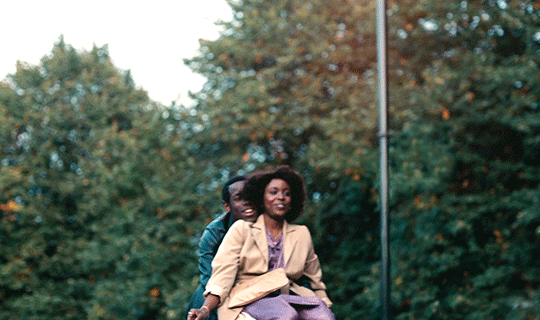
I love this movie for so many different reasons. It means so much to me as a woman of Jamaican descent to see an ode to Caribbean party culture in the diaspora
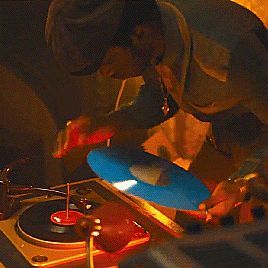
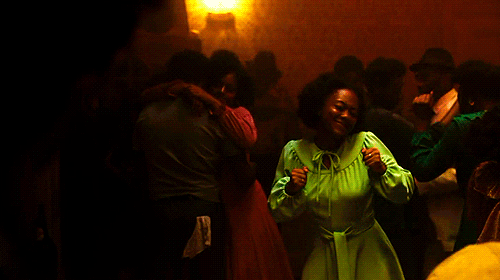
and even though it’s in London and even though it was in the 80s, there is so much overlap in Canada, it was basically like a spiritual experience watching this movie and on twitter, there was so much outpour of gratitude and feeling seen by Caribbean Canadians, it was like a whole moment, so this movie makes me super emotional.
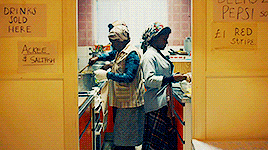
Like this scene, where they yell “Jah!” “Rastafari!” it got me in my chest and I had never experienced feeling so seen in film before because it’s specifically Caribbean, in this case Jamaican, and what I usually see is African American or movies from the Continent and this was diasporic and it was Caribbean
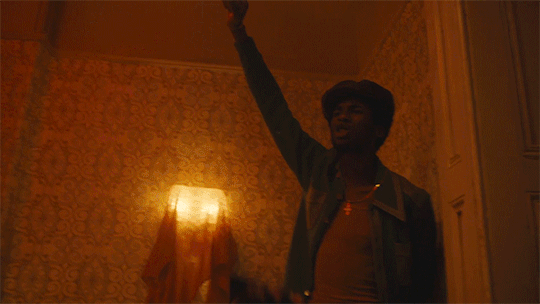
But what I also love about it is that even though it takes place over one night, it’s a love story between two young dark-skinned Black people and it’s handled with the kind of grace and beauty and weight that I like in my love stories, like it’s not Atonement, it’s not POTC, but it’s this culturally specific courting and coming together and it’s super sweet and just very nice
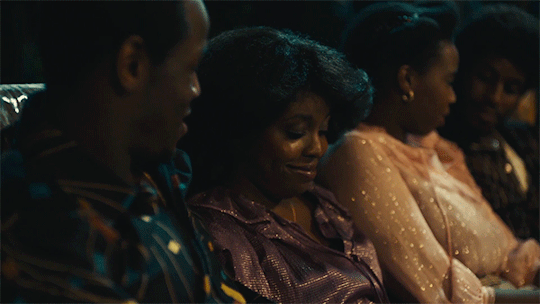


2. Alex Wheatle
There is this scene in this movie that is excruciating to me in its simplicity and it’s one of McQueen’s techniques or choices. So this installation in Small Axe is about Alex Wheatle who is an author and in the beginning we see his life in an orphanage and how he’s abused and ridiculed and how as a child he would be thrown in a room for hours just lying on his side

Then we get to him as an adult and we see the way the police harass Black youth and they take Alex throw him in the back of their van and he’s bloodied and beaten and he’s just lying on his side for hours. And I cried because that callback to his childhood was so brutal to me even though we don’t see excessive violence onscreen, it was just him lying on his side like when he was a kid and how systems upon systems are failing him and failing Black children, Black people and I didn’t need that spelled out for me, I just needed to see him lying on his side for minutes. And that’s kind of the power of McQueen’s directing/storytelling to me?
Another reason I really like Alex Wheatle - and the Small Axe anthology as a whole - is showcasing Black history in other countries
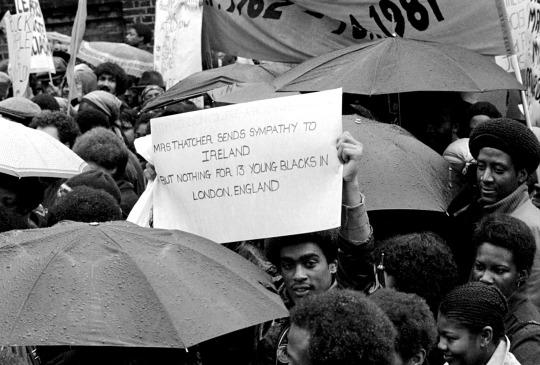


and it’s a great story about identity and figuring out your history, your roots, where you come from and how it informs you
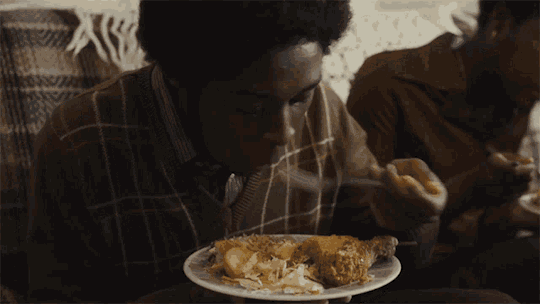
3. 12 Years A Slave

I didn’t know if I was going to watch 12 Years A Slave or not, I kind of make it a point not to watch movies about enslavement now and I haven’t seen a movie about enslavement since (I did watch the show Underground though). What I love about this movie is how it examines the human condition, how it examines resilience, how it examines the soul, really, through many of the characters but particularly Solomon. It’s that unflinching portrayal of emotion and the present that really stuck out to me. And also again some of McQueen’s choices, like when they’re on the slave ship, for a lot of it we don’t see inside, we see the rudders

but that inspired such dread in me? We see the trees a lot.


We see the setting. We see the environment and that just adds a whole other layer, Lupita Nyong’o spoke about that when filming, about just thinking about the trees and what they witnessed. But I watched it, I didn’t cry until the third act then I wouldn’t stop crying then I pulled myself together and a week later, my roommate was playing it in her room and I could hear it and I was trying to write for workshop and it was just the score that I could hear and I got so emotional I had to ask her to put her earphones in so I could work.
4. Education

This installment of Small Axe was again an educational one for me (pun intended) because I know the ways in which the education system in my country and in my province and in my city fail Black children and I know enough about how that happens in the States, I didn’t know so much about how it happened in England and this was very illuminating for me without it taking on the tone of a docu. There is this scene that is just so uncomfortable to watch because it’s long and it’s boring and it’s irritating and that’s exactly what you’re supposed to feel because you’re supposed to feel exactly what the characters would feel in those moments:
Education also has a scene where we hear an entire song, but it’s deliberately not fun, when the teacher torments all the kids with his acoustic version of “House of the Rising Sun.” Why that song? That happened with me!
Oh my god. The teacher brought in his guitar, and he started to strum. We’re this captive audience. That was it. But it’s interesting, about that sequence. Because it’s funny, and then it gets irritating, and then you get bored. You have to go through boredom to get to the other side of it, and then you get to something else. And then there’s another understanding of it. So it had to play out that way, in real time.

and you know by the end, the movie explores how to engage children, how to encourage children, how to advocate for children and the different ways you can educate children so it’s an optimistic movie and I appreciated that
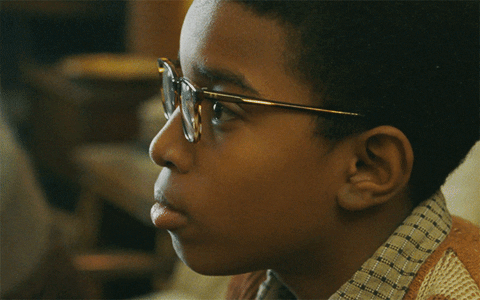
5. Widows

My second best experience at TIFF (Toronto International Film Festival) was watching Widows. TIFF screenings tend to be very quiet. But there’s a scene in Widows where after the protagonists (four women) do the work and get the money, Daniel Kaluuya watches them, holds them at gunpoint and takes the money, then leaves in his car. Then you’re with him in this car and he’s feeling good about himself and he’s laughing and he’s listening to this speech his brother makes then you see another car gain on him, run into him and it’s the protagonists and they take their money back and the entire theatre cheered and clapped and it was awesome. And that is the type of “girl power” scenes I like that aren’t “girl power” scenes? Where it’s just this man thought he could take what he wanted from these women and leave and they were like ummmmmmm?

I would say Widows is McQueen’s most commercial movie and it still doesn’t read very commercial and unfortunately Liam Neeson is in it but again I like the choices he made, I like that when Colin Farrell’s character is going on this racist rant in his car, we see the exterior of the car with his dialogue as a voiceover.

I like how controlled and tight the direction is and how throughout the movie I was on the edge of my seat in a different way, I was just tense until it was all over. It was also interesting watching his direction with Gillian Flynn’s screenplay interact with each other.
I had issues with this movie, mainly one moment which is when Alice, who is white, slaps Veronica (Viola Davis) -- Veronica slaps Alice first but Alice is a character who has been abused and who has been controlled by the men in her life, by her mother and she’s finding independence and so she exerts that by slapping Veronica back and I just thought there were other ways to show that.
6. Red, White and Blue
Another installment of Small Axe. My first husband stars in it and won a GG for it


and has this gem in it

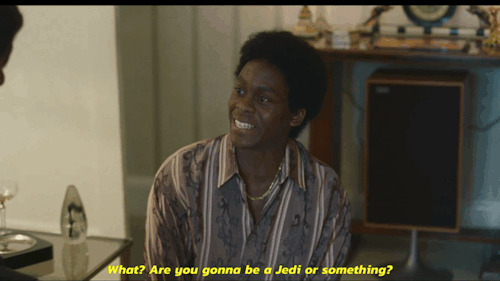
It’s a good representation of what it looks like trying to right a system from the inside, since this is about Leroy Logan who became a police officer and ended up policing the neighbourhood he grew up in and how he was trying to be a positive change in the environment and in the police force and the racism he experienced as an officer

7. Mangrove
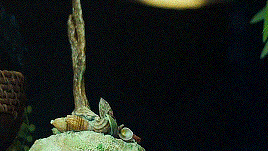

The first installment of Small Axe. To be quite honest I wanted to like Mangrove more than I did. It’s Steve McQueen so it’s a good movie, although the accents had some Trini people I know be like mmmmmmmmmmmmno, and again it’s also an educational movie because you learn about the Mangrove restaurant which was a Caribbean restaurant and hub for the community and for artists and authors and the police saw it as a threat so they constantly harassed the costumers and did raids and did everything in their power to shut it down.

And there are some great lines in this movie, I was most compelled when it became a courtroom drama, because that was some masterful directing

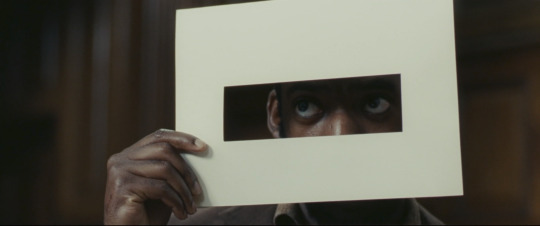
8. Shame

Shame was definitely uncomfortable for me to watch haha and it’s interesting because there were reviews that were like the title doesn’t match what we see because are we really expected to believe that the protagonist feels shame when we see him in New York having anonymous sex with [conventionally] attractive strangers and he has awkward moments with his sister and I was just like ............ if there’s anything McQueen is able to do is show how mechanical and compulsive Brandon’s sexual conquests are and his inability to actually connect because once he does he becomes impotent and pushes Marrianne away, his life is sterile and unfulfilling
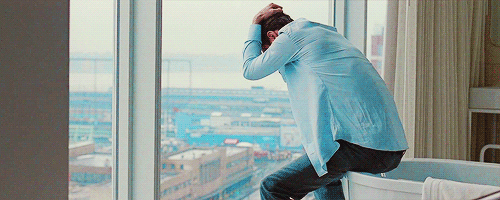
so, I don’t know, some of the reviews had me like, what movie were you watching?
13 notes
·
View notes
Text
You Set My Heart Ablaze (19/25)
Previous ________________________
Yennefer pulled up to the school gates in her car. It was two weeks into the summer term at Dol Blathanna and three weeks since she’d last seen Ciri. She rolled her eyes at her own sentimentality. She’d always adored Duny and Pavetta’s daughter. She’d been dating Geralt when Pavetta had announced her pregnancy. It had been a strange moment for Yennefer. She’d never thought of herself as particularly maternal and children had never been something she’d craved in life, but when Pavetta had shown them all the photos of the tiny baby growing inside her womb, something had changed irrevocably.
She wanted that.
She’d always thought her career and financial security would be everything for her, but how could it be everything when she was missing a family.
She scoffed. She’d been naive at the time. She’d thought that her relationship with Geralt would last that time, that it would be the time when they didn’t crash and burn. She’d even considered asking him to marry her. She had loved him and they’d been on and off for years already at that point. Geralt and Yennefer, the romantic saga that would put fairytales to shame. Duny and Pavetta had even asked them both to be godparents.
A month later Geralt and Yennefer had split up… again.
But now, seven year old Ciri was bringing back all those old wants and aches. She’d spent a week with the girl in Cidaris before handing her back to Geralt in Posada, just in time for the girl’s birthday. Yennefer had stuck around long enough to help Geralt wrangle Ciri’s classmates for her party and then she’d made her way back home.
Only it didn’t feel like home anymore.
She hated that she was always the one to leave her family behind. She hated that she had almost become an outsider to the most important people in her life. She was terrified that they would move on without her. Triss seemed to rather taken with Eskel, and Yennefer felt a twinge of regret for not introducing her own friends to the family sooner. Geralt’s family had become her own, but Yennefer had never quite managed to allow Geralt into her own life. The only person he had met had been Istredd, and that was because Is had confronted Geralt just after she’d started dating him at University.
She didn’t want to miss out anymore.
She’d already started looking for flats halfway between Cidaris and Posada, she’d even thought about moving her gallery to Vengerberg. Her family had originated from there generations ago and she’d always thought it would be a little on the nose to move there but there was something poetic about it that intrigued her, that was after all why she had chosen Aedirn out of all the galleries offered to her at a young age. A Vengerberg canvas in Aedirn Gallery. The irony had been too good to resist.
Vengerberg was also much closer to Posada and to Ciri.
For now she had to be contented with ferrying back and forth across the Continent whenever she wanted to see Ciri, the girl she had come to love as a daughter.
She groaned when she noticed Jaskier standing amongst the children. Of course it was his turn on after school duty. Nevertheless she stood tall and glided towards the gaggle of children. She’d texted Coën from the petrol station on the way to Posada to let him know that he didn’t need to pick Ciri up from school tonight. Vesemir would be over after work to look after Ciri this evening. Yennefer and Geralt would have the delight of summer parents’ evening. Yennefer was rather looking forward to being on the other side of it for the first time. Poor Buttercup didn’t stand a chance.
Ciri screamed excitably when she saw Yennefer approach and Yennefer soon had her arms full of her daughter as she knelt down to hug Ciri.
“Auntie Yen!” Ciri laughed. “But I only just saw you!”
“I know, Princess,” Yennefer hugged the girl tightly “but I couldn’t stay away.”
“Are you staying this time?” Ciri asked, looking up at her with wide emerald eyes.
Yennefer sighed with a heavy heart. “Not this time, Ciri, but I’m working on it, alright?”
Ciri pouted and scrunched her nose up. “But…”
Yennefer bopped her nose. “Patience, Ciri.”
“Yennefer, what a delight.” Jaskier drawled sarcastically.
Yennefer looked up at the teacher with a smirk. Oh the things she would say if they weren’t in front of the children.
“Buttercup, pleasure as always.” Yennefer returned his sarcasm.
It wasn’t that she hated the teacher, quite the opposite in fact, she actually admired him in some ways but at this point the scathing remarks and barely concealed loathing was just a part of their routine.
“Mr Rivia didn’t mention that you would be picking up Ciri this evening.” Jaskier tilted his head, tossing his fringe away from his eyes. “It really is common courtesy to let the school know.”
“Geralt doesn’t know, Buttercup. It’s called a surprise which requires subtlety and discretion, neither of which you possess.” Yennefer smiled at the teacher.
He glowered at her with blue fire dancing in his eyes.
“Oh I can be very discreet, I’m more discreet than, than a Redanian spy!” Jaskier huffed with his hands on his hips. “Oh no.” His jaw dropped at some unspoken realisation. “No no. No!” He pointed at her accusingly.
“What’s wrong Mr Jaskier?” Ciri asked.
Jaskier blushed and stammered. “Oh, nothing. Nothing’s wrong, little Buttercup.”
“Mr Jaskier!” Ciri gasped. “Are you lying to me?”
Jaskier froze and Yennefer cackled. “Yes, Jaskier, Are you lying to her?”
He stammered unintelligibly before clearing his throat. “Right. Yes, Sorry Ciri. I meant that there is nothing wrong that you need to worry about, I just remembered something.”
Ciri put her hands on her hips, looking a little too much like Jaskier’s mini-me for Yennefer’s liking. “About Auntie Yen?”
Yennefer smirked. She could see the litany of curses Jaskier was saying in his head. He smiled brightly down at Ciri, though Yennefer could see the anger still dancing in his eyes when he glanced back at her. “I had just forgotten it was parents’ evening tonight. Yennefer reminded me, that’s all Ciri, I promise.”
Ciri scowled up at her teacher, scrutinising his words and then broke into her own dazzling smile. “Ok!”
Jaskier visibly relaxed. “So, Yennefer, will you be looking after Ciri tonight?”
Yennefer shook her head. “Not this time, Buttercup. I will be joining Geralt for parents’ evening.”
Jaskier raised an eyebrow at her. “Oh?”
Ciri squealed. “Are you and dad getting back together?”
Jaskier’s face lost all colour. “An… unexpected development.” His voice cracked.
Yennefer sighed. She didn’t want to get Ciri’s hopes up. She had no intention on getting back together with Geralt, she’d just been trying to get a rise out of the teacher, which had absolutely worked. “We can discuss this in the car, Cirilla. Come now.”
It took a while but Yennefer eventually managed to convince Ciri that she was, in fact, not dating Geralt again. The young girl seemed a little disappointed by this.
“He just gets lonely.” She sniffed. “He tries to hide it but I see it, when he doesn’t realise I’m looking.”
“I know, Princess, but Geralt and I,” Yennefer sighed “We weren’t a good match.”
Ciri scrunched her nose up. “I just thought, if Geralt’s my dad and you were dating then… that would make you my mum.”
Yennefer almost crashed the car. As it was she had to pull over, her hands were shaking too much on the steering wheel.
“Auntie Yen?” Ciri asked quietly.
“I wouldn’t mind if you called me mum’” Yennefer took Ciri’s little hand in hers and squeezed tightly. “I can be that, with or without Geralt.”
Ciri grinned and unbuckled her seatbelt before clambering into Yennefer’s lap.
“Ok, Mum.” Ciri mumbled as she hugged Yennefer tightly. Yennefer felt like she couldn’t breathe, like a single breath would shatter the moment and she’d wake up back in Cidaris and this would have all been a dream.
She settled for holding the girl in her arms in blessed silence, holding onto the feeling for as long as she possibly could and praying to the gods that the moment would last forever.
___________________________________
Yennefer had just about managed to find something edible enough to feed Ciri for dinner. She’d been disgusted at the amount of tins in the cupboards compared to the fresh vegetables in the fridge. Luckily, Geralt seemed to have a better stock of frozen vegetables to make up for the lack of fresh produce. Ciri had grumbled about it and said that Coën and Geralt usually let her have pizza and chips.
Yennefer challenged this proclamation with a stare and eventually Ciri mumbled something about pizza and chips being a Friday or weekend treat.
Ciri was now scowling at the plate of chicken and vegetables in front of her. Yennefer rolled her eyes.
“Ciri, you have got to eat something.” She sighed. “You’ve even got chips.”
“I don’t like spinach.” Ciri pouted.
“You ate it in Cidaris.” Yennefer stated cooly. “What’s changed, Princess?”
Ciri scrunched up her nose. “Slimy, tastes funny.”
Yennefer narrowed her eyes at the greenery on Ciri’s plate. “Let me try.”
Ciri pushed the plate towards her and Yennefer took a forkful, it tasted exactly the same as when she’d made it for Ciri back at her flat in Cidaris. She pursed her lips together and told Ciri to close her eyes.
“Why?” Ciri asked.
“The magic only works if you have your eyes shut, Princess.” Yennefer said calmly, allowing herself a small smile when she noticed Ciri trying to peek from behind her hands. “Eyes shut, Ciri.”
“Fine!” The young girl huffed.
Yennefer moved the spinach around on her plate and whispered a low fake incantation under her breath, just loud enough so the girl could hear. Ciri giggled and wiggled excitably in her seat.
“Now, Ciri. You must understand that Geralt can’t do this and it takes a lot of power so I can’t do it every meal time, alright?” Yennefer stated firmly, her hand hovering over Ciri’s plate.
“Yes, Mum.” Ciri drawled and Yennefer knew if the girl’s eyes were open she’d be rolling them.
“Good, now open your eyes and eat your dinner.” Yennefer said, pulling her hand away just as Ciri opened her eyes.
Ciri wolfed down her dinner without another word and Yennefer let out a small sigh of relief. After dinner, Yennefer plopped Ciri down in front of the TV to watch that pony show that she was so fond of, Geralt’s influence no doubt.
She sat down beside Ciri, scrolling through her social media on her phone. She shared a few posts from upcoming artists that she wanted to promote and tapped out a few biting remarks on replies that were from sensitive assholes who didn’t like that a woman was successful in their industry. She vaguely tried to follow the plot of the episode that Ciri was watching but she’d never understood the talking ponies.
She looked up when she heard keys in the door.
“Dad!” Ciri jumped up and ran to the front door. “Uncle Vesemir!”
Geralt picked Ciri up as she jumped at him. “Hi Princess, good day at school?” He asked before noticing Yennefer lounging on the sofa. “Yen?”
“Geralt.” She smiled and made her way across the room. “Vesemir.”
“Hello Yennefer.” The older man nodded.
Geralt shifted Ciri into one arm and pulled Yennefer in for a hug.
“I didn’t know you were visiting?” He asked gently.
She kissed his cheek and the pulled away to ruffle Ciri’s hair. “I was hoping to join you for parents’ evening. She’s my goddaughter too. I want to be a bigger part of her life, Geralt.”
Geralt scowled and glanced at Vesemir. “Yen.” He sighed with a sad smile. “I don’t think—”
“Not like that.” She swatted his arm. “I’m doing this for Ciri, Geralt. Not for you.”
Geralt visibly relaxed. “Right.”
“Mum can do magic!” Ciri shouted, a little too loudly judging by the way Geralt winced.
He raised an eyebrow at Yennefer. “Mum?”
“Obviously, Dad you never told me Mum was magic!” Ciri pouted.
Geralt hummed and put Ciri down on the floor, kneeling next to her. “Well she never told me, cub.”
Ciri covered her mouth with her hands, her emerald eyes went wide. “Was it meant to be a secret?” She mumbled behind her hands.
Yennefer shook her head. “Not at all, your father just never noticed.”
Geralt grumbled.
“Only the wisest of people realised, little sparrow.” Vesemir chuckled and moved further into the living room. “Ciri, are you going to show me what you’ve learnt on that instrument of yours? Geralt says Priscilla has been very impressed with how quickly you’ve picked it up.”
Ciri grinned and ran to the corner of the room the pick up the small ukulele case. “Mr Jaskier helps me during lunch sometimes! He says that practice makes perfect and even Mr Jaskier needs to keep practicing to learn new things all the time!”
“Does he now?” Yennefer smirked at Geralt who had suddenly gone very still.
“Yup!” Ciri grinned and pulled out a small plastic whistle. “This helps to make sure the strings sound right.” She explained and then started to blow on the whistle, and plucking at the strings of the small instrument.
“That’s very clever, little sparrow. Show me, how do I hold it?” Vesemir asked warmly.
And just like that the old man had Ciri’s full focus.
Geralt leant against the wall with his arms cross. His hair was pulled into a messy bun at the back of his head today, not his usual look but one that was rather handsome. Yennefer felt a pang of regret and yearning at the loss of their relationship but it passed quickly. They’d both moved on for a good reason, and things were going well with Istredd, slowly but well.
“Why are you here, Yen?” Geralt asked quietly.
Yennefer rolled her eyes. “I already told you that, Geralt.”
He shook his head. “Nothing is ever so simple with you.”
“Can’t you just trust me for once?” Yennefer asked, bristling a little at his accusation.
He was right, of course, she did have an ulterior motive for being here. She wanted to watch his interactions with the teacher, perhaps plant a few seeds of jealousy so they’d have to act on their feelings. This was her first plan. Jaskier knew that Yennefer was Geralt’s ex so he would no doubt be envious to see them co-parenting Ciri. She just needed to make sure she didn’t overdo it and put the teacher off.
If this failed then she had another idea. She wondered whether Jaskier knew that Geralt was attracted to men. Geralt didn’t exactly radiate queer vibes and passed very well as a straight man when it suited him. Therefore she’d been in contact with another one of Geralt’s exes, an older man that he’d dated briefly when they’d been broken up. Regis and Geralt’s relationship hadn’t ended badly and the two were still friends. They didn’t see each other very often due to work commitments but they had the kind of friendship that lasted regardless of time and distance. Regis had been delighted to hear about Geralt’s little infatuation with Jaskier and had agreed to help out should it be required.
But that was Plan B. Plan A was tonight.
He narrowed his eyes and then nodded with a low hum.
“We have about an hour before we need to leave. I have the last slot with Jaskier. Vesemir will be here to put Ciri to bed.” Geralt explained.
Yennefer nodded and pulled her friend over to the living room where Ciri was patiently trying to teach Vesemir how to play a nursery rhyme on her ukulele. “Come on, White Wolf, what have I missed?”
______________________
“You don’t have to do this, Yen.” Geralt grumbled as they strode into reception together.
Yennefer rolled her eyes. Geralt had said the same thing at least a dozen times on the drive to the school. At least he’d had the common sense to let her drive instead of going in that disgusting truck. “I want to do this, Geralt, and your whining is not going to change my mind so shut up and try not to look like I’m leading you to the gallows.”
“Feels like it.” He muttered.
At this rate her eyes would be stuck in the back of her head. She linked her arm with his as they entered the foyer. Triss greeted them with a wave.
“Yen!” She called happily. “Geralt.”
“Hi Triss.” Yennefer smiled at her friend, a little envious of her easy going nature. There wasn’t a single person that didn’t adore Triss, she just had this way about her that made you want to be her friend, made you want to be better. Yennefer was not immune to this. It was one of the reasons they had remained friends for so many years.
“Do we need to sign in?” Geralt asked, straight to the point as always.
Triss passed him the register. “Just like before.”
Geralt hummed thoughtfully. “Hopefully not.” He gave Triss a sheepish smile.
“No.” She agreed with a laugh. “I would really prefer it if we didn’t have to call the police.”
Yennefer frowned as she looked between her ex and her best friend. “The police?” She asked haughtily.
“A misunderstanding.” Geralt grumbled. “If you’re staying the night I’ll tell you later.”
“Staying the night?” Triss asked, taking back the register with a raised eyebrow.
“School hall?” Geralt asked, ignoring Triss’s look of surprise.
“Umm. Yes. That’s right.” Triss was still eyeballing them.
“I’ll text you later.” Yennefer murmured and followed Geralt towards the main hall.
There were tables stationed all around the room, just like she remembered from her time as a teachers. Fuck she hated Parents’ Evening. It had been hell on earth. She caught Istredd’s eyes across the room and gave him a small smile. She was grateful that Geralt had book the last slot of the evening, it meant that there was a chance she could see Istredd when he was done. Luckily it was a Friday which meant that even if she didn’t get to see him tonight, there was always the weekend.
“Ah, Geralt!” Jaskier waved them over with a smile as another couple stood up to leave. “Yennefer.” He added more cooly.
Yennefer frowned. Triss and Eskel hadn’t been lying when they’d said that both Geralt and Jaskier had stopped moping around, but she hadn’t been expecting Jaskier to act so friendly towards Geralt, especially after weeks of supposedly avoiding him.
What the fuck was going on?
She glanced over at Geralt to see his reaction.
The man was fucking blushing.
“Mr Pankratz.” He shook Jaskier’s hand, smiling far too fondly for Yennefer’s liking.
Now, many people said that Geralt Rivia was hard to read. He had a habit of not saying much, especially when he was feeling overwhelmed, but Yennefer had always found him to be an open book. His face didn’t hide much and she had learnt to read even the smallest twitch of a smile dancing on his lips. So the way he smiled so openly at Jaskier told Yennefer everything she needed to know.
“Geralt,” She whispered in his ear, gripping his arm tightly. “Tell me, exactly how long have you two been fucking?”
Geralt growled and pulled away from her. “What the fuck, Yen?”
Jaskier laughed nervously. “Geralt? What’s going on?”
Geralt’s face was like thunder. “Nothing. Right Yen?” He asked pointedly, glancing over at Tissaia’s table.
Ah yes. Tissaia was currently headmistress, she’d heard all about that from Triss and Is.
“Oh no one is supposed to know!” She said a little too loudly.
“Shut up, Yen.” Geralt grumbled.
“Know what?” Jaskier asked. Geralt’s eyes flashed to Jaskier dangerously. “Oooh. That. Right. Yes.”
Yennefer smiled sweetly at the two idiots in front of her. “So, how long?”
“How long have I been teaching Ciri?” Jaskier asked pointedly.
Yennefer smirked but decided to it go. They were here to discuss her daughter after all. “Ciri, right yes of course. Since September I assume.”
“That’s right.” Jaskier said firmly. “The whole class has made excellent progress with learning sign language, one of my Buttercups is deaf,” He explained “but young Ciri is leaps and bounds ahead of the rest of them. She has the amazing ability to absorb new information and a wonderful dedication to her class work and friends.”
Yennefer smiled, genuinely for the first time since they’d entered the hall. She knew Ciri was special but hearing Jaskier confirm it warmed her usually icy heart.
“I am concerned that she’s throwing herself into her work instead of learning to process the trauma in her life.” Jaskier added. “Did you think anymore about what I said, Geralt?”
Geralt nodded. “I’ve been looking. I just…” He paused and frowned as he tried to gather his words. “I don’t know how to talk to Ciri about it.” He admitted.
“About what?” Yennefer asked. “Maybe I can help?”
Jaskier looked at Geralt with a tilt of his head. Geralt gave a small nod.
Yennefer scoffed, apparently they were communicating non-verbally now as well. What a fucking delight!
“I suggested that Ciri might benefit from some therapy.” Jaskier said quietly. “She’s been through, gods, she’s been through so much.”
“But she’s fine.” Yennefer interjected.
“On the surface” Jaskier agreed “but we don’t know, we can’t know, how much she’s bottling up underneath.”
“It’s a good idea, Yen.” Geralt said softly.
Yennefer sighed. She hated it but they were right. She remembered her own therapist from her childhood, they weren’t happy memories and the thought of Ciri having to go through the same thing made her want to scream, but in the end it had helped her. It was just a difficult process with no clear step by step journey, some days it felt like the therapy just made it worse before it got better again.
“Yen?” Geralt took her hand and squeezed gently.
“I’ll talk to her” She agreed “but the decision is hers.”
“That’s all we can ask.” Jaskier smiled sadly and then immediately brightened up. “Pris tells me her ukulele lessons are going wonderfully! She might even want to consider getting a guitar soon, it will be a little difficult for her to hold an adult guitar but there are smaller sizes that she can look at, it will be more challenging than the ukulele. There are six strings rather the four on the ukulele. My lute has thirteen so we don’t recommend that one for a while.”
“Not everyone wants to learn every stringed instrument in existence, Buttercup.” Yennefer said dryly.
“Which is a tragedy!” Jaskier laughed. “And I’ll have you know, I bought a flute the other day. I’m branching out.”
Yennefer smirked. “Practicing your blowing skills?”
Jaskier raised an eyebrow at her with a playful smile. “Oh, darling, I don’t need any practice with that.”
Geralt cleared his throat and blushed vividly. “Let’s stay on topic shall we?”
Jaskier and Yennefer, surprisingly, laughed in unison at Geralt’s discomfort.
Well wasn’t that an unexpected development?
Perhaps Jaskier wasn’t as bad as she thought. They shared a smile before Jaskier delved deeper into Ciri’s progress and work at school. _____________________
Next
#the witcher#geraskier#modern au#fireman!geralt#teacher!jaskier#Yennefer of Vengerberg#yennefer#Geralt#Jaskier#you set my heart ablaze#wolfie's witcher writing
38 notes
·
View notes
Text
Episode 27! It’s a transitional episode and I have Thoughts but nothing major really happens until the very last second :P
Cap of the day!

You know what they saw about the megane shine... next season’s villain is Jou-senpai!!! you heard it here first!
More below!
GAWD I LOVE JOU
no but SERIOUSLY... so glad to have the rest of the team back. They really do make EVERYTHING better. Taichi and Yamato, yeah they’re cool, I love them, but they just don’t carry the show by themselves. And in a similar vein, the rest of the team needs Taichi and Yamato too. Otherwise they have no reason to be all dramatic and show off their cool sides.
(other than Koushirou of course who was just born Cool but it’s the kind of cool most people don’t recognize until you literally own the entire world Koushirou’s three steps from becoming Seto Kaiba except NICE)

ok back to business... last week we left off with the team finally reuniting and bringing Hikari along. For some reason the two groups both decide to stand in a straight line like two baseball teams about to shake hands. Leomon’s team still looks fricking ridiculous
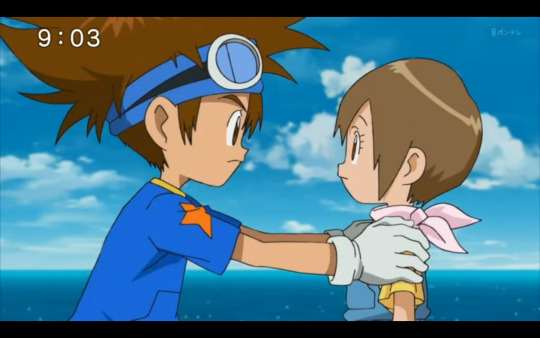
Sooo jury’s out on how Taichi’s gonna react to Hikari! Yamato’s been so chill with having Takeru around, I started to wonder if we’re gonna see super over protective big bro Taichi instead this time! But for the most part he’s just surprised that she’s not surprised by the Digimon.

Hikari is creepy. lol. She’s very much the “cute little sister” type and this episode, at least, we didn’t see any kind of initiative from her, which is to be expected, I mean give the kid some time to adjust. We don’t see a lot of personality though either... I guess we can say she likes cute things, and she’s pretty darn calm... I don’t really like her voice though. It’s a perfectly fine little girl voice, but she always sounds like she’s about to doze off...
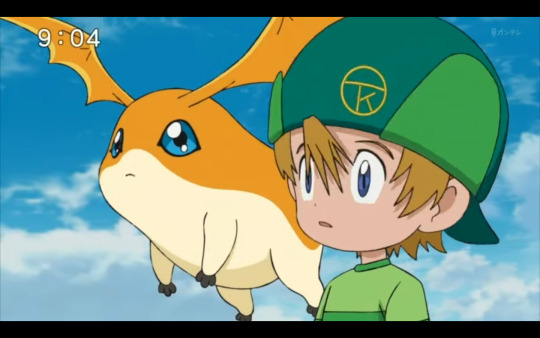
Obligatory “cutest couple” pic

The group then basically recaps what’s been happening in the human world recently. Which is all pretty important stuff. But for some reason Taichi and Yamato don’t fill them in on what they’ve gone through?? They have to explain Takeru and Patamon because well there’s a surprise but then they’re like “oh yeah Patamon’s the holy Digimon” and I’m like WHOA. DUDES. IT’S THE HOLY DIGIMON. THE THING Y’ALL RISKED YOUR NECKS FOR. Shouldn’t there be a little more interest, both in the telling and the hearing?? XD
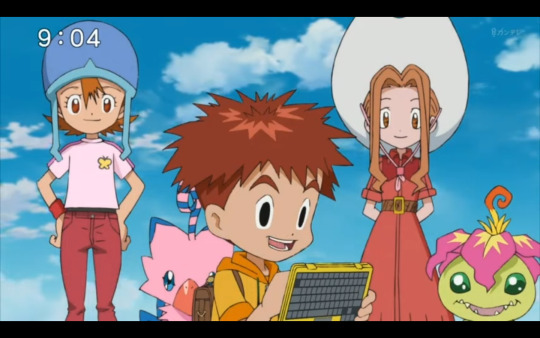
Koushirou’s most excited to update their digivices.
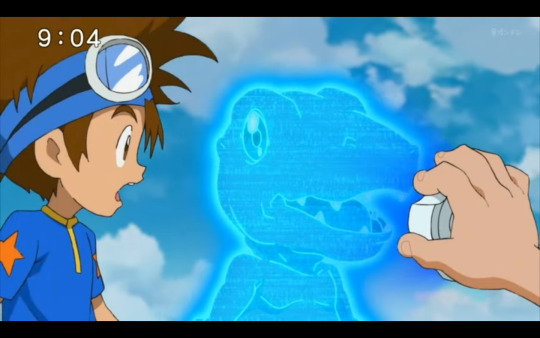
Taichi: Why so blue, Agumon?
Agumon: I shouldn’t have had so many Hawaiian blue energy drinks... but how else did they expect me to fight non stop
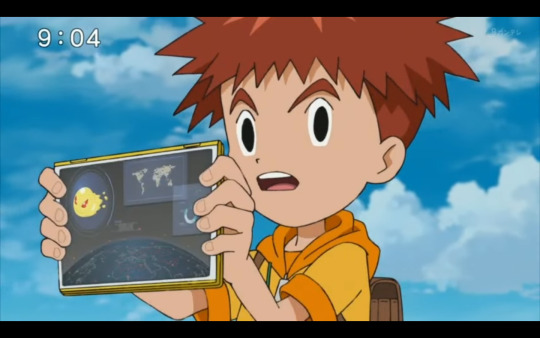
Koushirou even has handy dandy charts and images to illustrate. He’s going to get hired somewhere and immediately promoted to CEO, by the CEO.
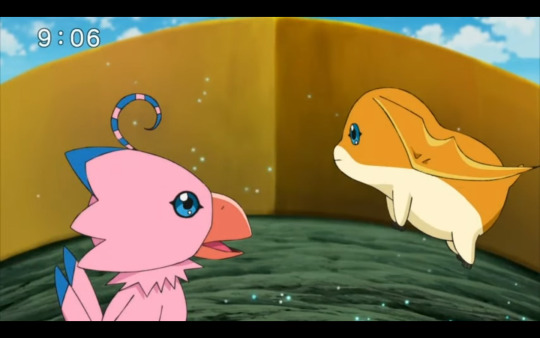
Patamon: “Hi! I’m the Holy Digimon! Bow before me!”

Jou introduces himself to Takeru and Hikari as the “leader” and tries to convert them to his religion (No-play-only-study-ism) to make them his first acolytes when he inevitably becomes the season’s true final villain. But Gomamon’s all over it.
Gomamon: “You can’t have acolytes until you master maniacal laughter, Jou, didn’t you read ‘Villainy for Dummies’ like I told you to??”
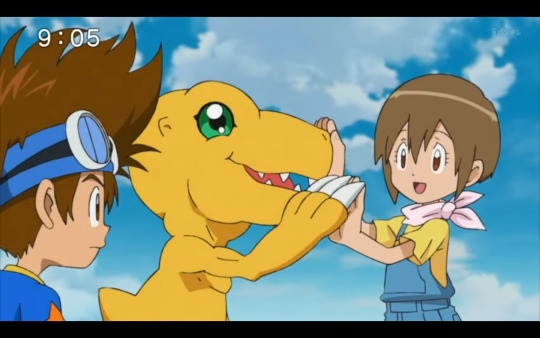
Agumon adorably walks right up to Hikari and asks her if she’s okay and if she feels scared. Hikari says “Agumon’s cute!” Taichi’s face is like “cute? cute?? he’s a dinosaur! dinosaurs are cool!” but he wisely says nothing because you cannot argue with girls about what we think is cute you just cannot

Then Hikari notices something even cuter! Patamon!
Hikari: So cute! I want ten!
Takeru: Sorry, he’s one of a kind and mine!
Hikari: *looks at him* So cute! I want ten!
Takeru: Wait... of me?
Hikari: (u3u)~♥ チュ
Takeru: (o///o)~♥

love at first sight???? lol
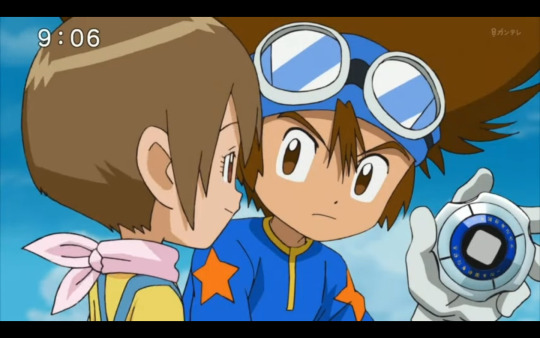
In a nod to the original series, we get a scene of Taichi asking Hikari if she has a Digivice and her being like “oh that thing, I filled it with catnip and gave it to Miko”
Taichi: No digivice! Well I guess this means there’s no way she’s a Chosen Child like us!
Agumon: Infallible logic

Meaning the Zurumon are on the move! this time to FREAKING NASA
Taichi: *most unimpressed voice possible NASA??
I thought hey, it’ll be fine, we’ll just have to fight some more... but
Nasa: *launches a rocket*
The internet:

it’s all just variations of people oh-no-ing in Japanese. A little further down someone just writes “Explosion” in English lol
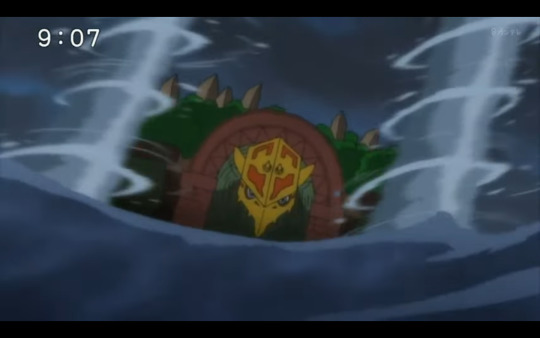
Due to the weirdness in the digital world that is affecting the human world, a bunch of waterspouts appear in the ocean. Eldradimon’s like “oh bother”
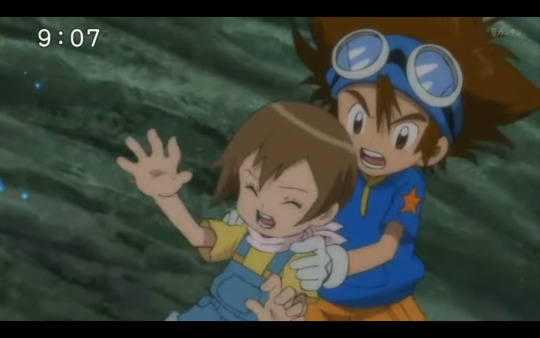
he protec!

Mimi and Palmon rush to comfort each other with a hug.

Jou... immediately gets seasick.
Gomamon: So how’s that maniacal laughter coming along?
Jou: DON’T MAKE ME OPEN MY MOUTH

Awwwww. Point of interest.... Koushirou is barely larger than Hikari x’D
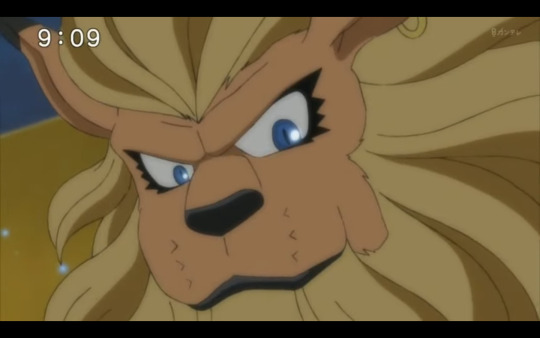
Leomon, for some reason, decides now we must part. He doesn’t think these kids can survive this storm and offers to protect them as they escape. The kids are powerful against evil monsters but weak to weather lol. I’m sure the actual logic in no way was “Now that the rest of the team is back from their pointless stint in the human world we no longer need Leomon to play back-up”

They don’t agree without an argument, but Leomon insists, because he believes the Chosen Children have other important things they are meant to do. We get a cool scene of everyone making their escapes. Sora takes Mimi with her

Taichi and Hikari join Koushirou
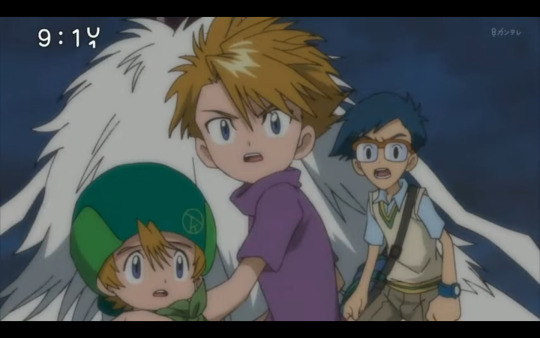
And Yamato and Takeru “join” Jou (but really Yamato’s the one calling the shots because Jou’s busy struggling not to pee his pants)

It’s just in the nick of time... before a giant whirlpool seemingly sucks Leomon and Eldradimon into the sea.

Taichi: Oh my god did they just DIE??
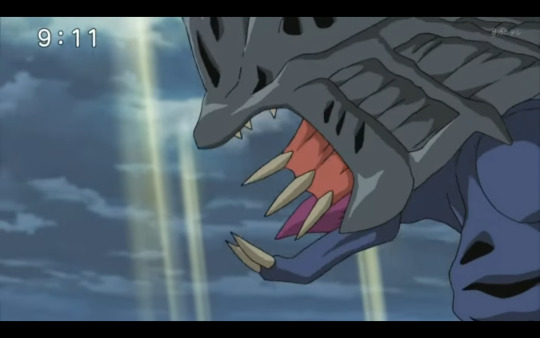
Kabuterimon: Don’t look back!
Taichi: I know... we have to respect their sacrifice...
Kabuterimon: Well, that and you might be scarred to see Leomon’s reenactment of Ariel at the bottom of Ursula’s whirlpool
Taichi: huh
(look I think I’m funny and that’s what counts)

Getting all split up like this made me think they were gonna end up split up for reals, but the team manages to stay together for now.
They arrive at a new continent covered in weird spikes! Yamato picks up his digivice like a walkie-talkie and says one word: “Taichi”
it amuses me that he could only bring himself to say “Yagami” for a good while in the beginning but then he finally started saying “Taichi” and now he just can’t stop!!
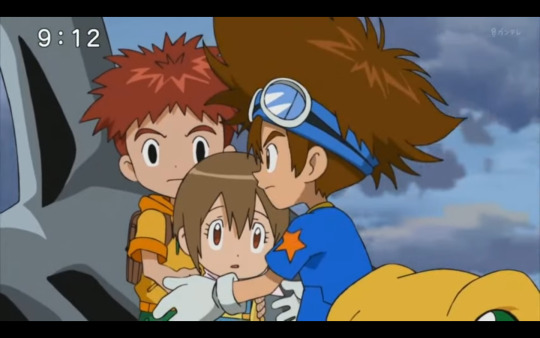
Anyway he’s alerting the others to the fact that some? of the spikes on the island are actually Tortomon about to attack them. Before going to join Greymon’s attack, Taichi flings Hikari at Koushirou “HERE PROTECT MY SISTER SINCE YOU HAVE NOTHING ELSE TO DO”
jk but seriously... why does Taichi need to be all up in the action? Until now I thought it was something they all had to do to help their partners, because they usually ride on them during battle, but this episode seemed to suggest that Taichi goes out of his way to do it even more than is maybe necessary. Which doesn’t exactly come as a surprise, but xD

Reason #1229345894 why the team is better when they’re all together: Mimi is hilarious and SORA HAS A GOSH DARN PERSONALITY. She DOES, folks. We hardly got to see it recently -____- this episode at least lets her react to the others. Ugggh. Irony of ironies, Sora needs more love.
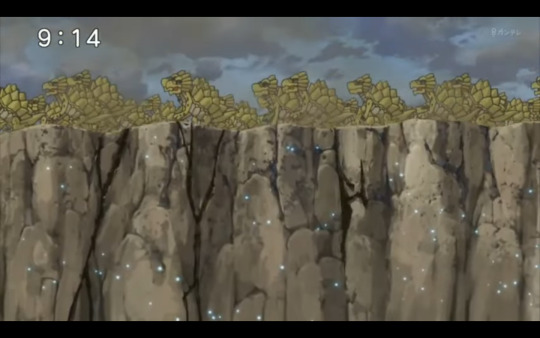
It’s a stampede! Simba! NOOOOO!

Sooo... the battle with the Tortomon goes pretty well but then this guy called Groundramon or something appears and uh... starts to eat them... like it’s pretty visceral y’all o_o le eugh
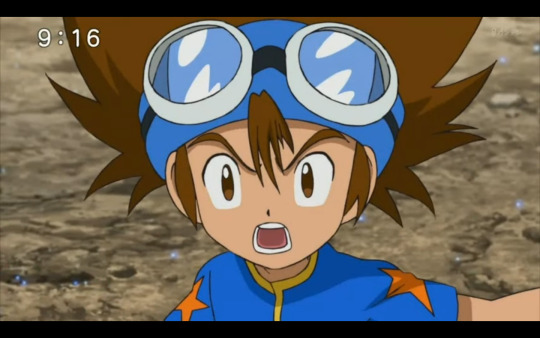
Taichi is shocked and recalls last episode when he saw Seadramon power up and evolve after eating Ebidramon. He does not choose to mention the time he was eaten by Devimon. EH IT’LL BE FINE I’M SURE THAT WASN’T IMPORTANT ANYWAY

Greymon: Don’t get eaten.
Garurumon: lol same to you
The Agumon/Gabumon bromance is honestly one of the best things about this season. Not that we get a ton of it, but when we do we do I always feel like “yes, that’s Digimon, that’s it right there”

The Digimon rev up to face off with their cannibal and Groundramon quickly decides Ikakkakumon looks the most nutritious. He probably has lots of blubber and meat on him so I guess I’d go for Ikkakumon first too
Ikkakumon: Don’t eat me!

Jou: Wait don’t! He was teaching me how to be cool!!!
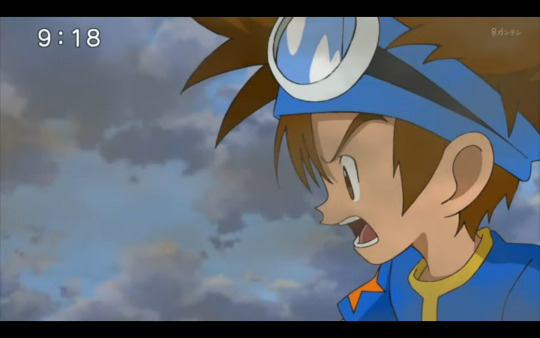
Taichi: Eat him! Eat him Groundramon! I can’t let Jou be the cool one!
Yamato: Are you two fighting to see who can reach peak villain status first?
Taichi/Jou: I’m naturally competitive
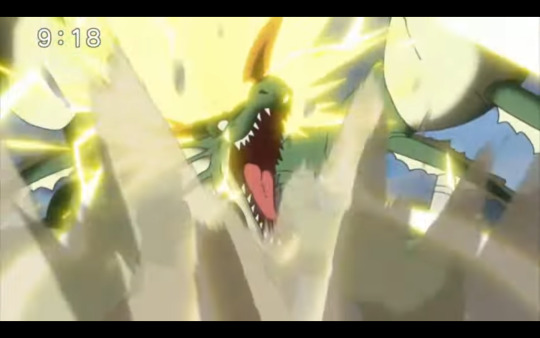
ka-boom!

Our heroes are blown back by. Takeru quickly runs to check on his big brother who seems to smack his head on a rock...

Yamato: It’s cool. I’m cool. The definition of cool. Ishida Yamato. That’s me.
Sora: Oh no, I think he’s got a concussion.
Takeru: No, that’s how oniichan is on a normal day.
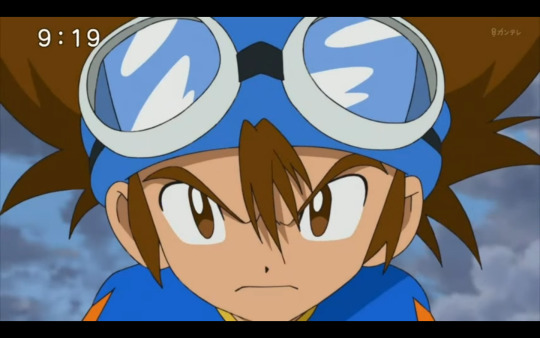
The team starts to feel overwhelmed! That’s when a fire ignites in Taichi’s eyes and he announces the next siege!
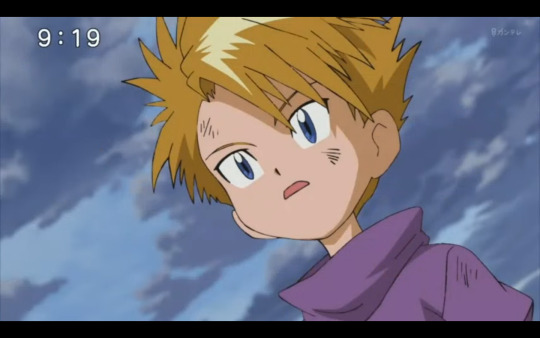
Yamato: Taichi...
no but okay what even IS this moment. The episode goes out of its way to show us Yamato reacting to Taichi not giving up. This is a Thing. I don’t know what he’s feeling here - impressed? Happy that Taichi’s able to bring everyone together when they’re feeling defeated? Or is he also recalling how that same desire to never fail almost got him killed and his partner transformed into an evil evolution a few episodes ago?
So like I keep saying I don’t see why we had to split up the team for so long, and for now I stand by that. But one thing’s clear: the show wanted only Yamato around to witness what happened to Taichi. (I mean, Takeru was there too, but he’s a baby xP) And even Yamato doesn’t know everything - we don’t know how much he was actually conscious for. But I feel like, if there was any point to the separation at all, that was it. I hope so anyway. I like the idea of Yamato grappling with how to know when Taichi’s going too far while at the same time really valuing the way Taichi’s able to push them to victory.

Turns out Taichi’s new plan is... even bigger guns!

Pointed directly into Groundramon’s mouth!

Yamato: This is madness.
Taichi: No! This! Is! DIGIMON ADVENTURE:!!!!

Everyone attacks poor Groundramon in the mouth x’D im crying
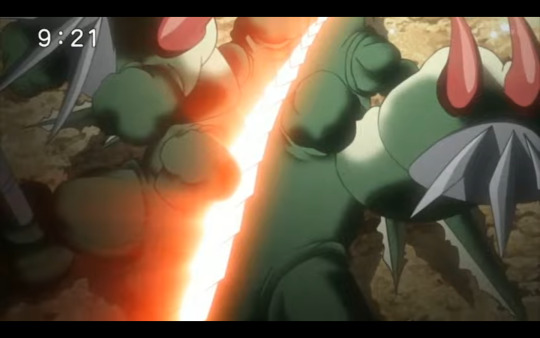
The combined attacks seem to overload Groundramon and then MetalGreymon launches missiles down his throat, which cause these internal explosions. Uh, gross... like if there’s any time Jou should be puking it’s now
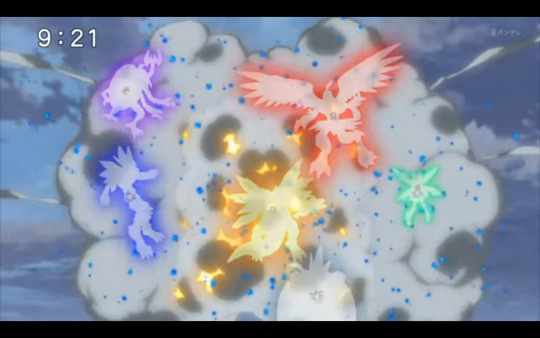
we won by being even more violent than normal! yay us!

Not that this means we get a break because Darknightmon chooses now to make his dramatic return!

They get blown back again

... but I love how adorably protective the big brothers are whenever it happens <3

Yamato and Taichi finally remember they never told the others much about what they’ve been up to recently, other than “we found the holy Digimon.” Now they add “and we found Darknightmon too.” Wow what a level of detail.
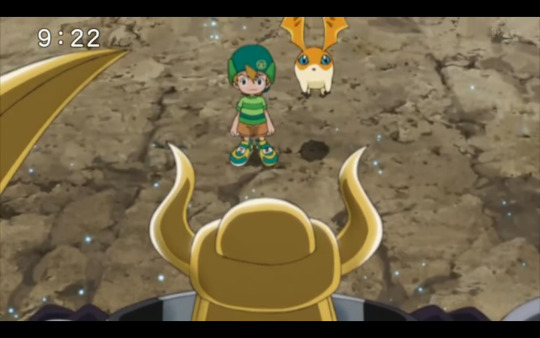
I honestly... expected Darknightmon to be interested in Hikari instead of Takeru xP It was a little too predictable so I was glad when he seems to go right for Takeru and Patamon after all.
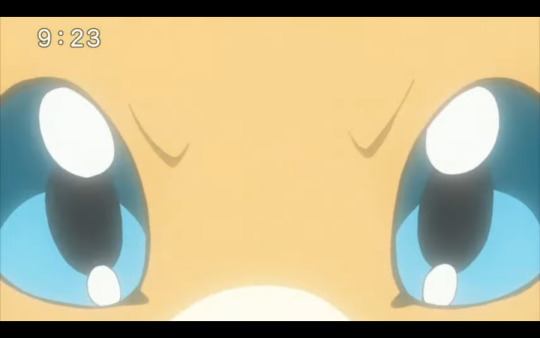
Patamon, who’s recent hobby has been watching musicals, begins to sing:
Don’t ever kick a dog
because he’s just a pup!
You’d better run for cover
when the pup grows up!

Taichi: Uhh did he not see the part where Gavroche dies??
Yamato: He fell asleep before we got that far.

Angemon!!

Honestly... as a fan of 99 Adventure, Angemon there was SUCH a dramatic thing and... this isn’t. I know, I know, it’s a different show, we do things different in 2020... I just remember the excitement I felt about Angemon’s first apperance though. But, to be fair, although it takes a long time before his second appearance, once it happens Patamon always evolves to Angemon without all the fanfare and it’s just a normal evolution. So... yeah, this all makes sense xP
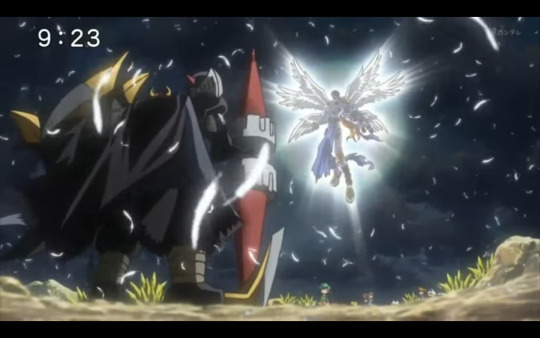
At least we end on a cliffhanger! What’s gonna happen?? Tune in next week!

So I guess I wasn’t that off about the team splitting up again, I was just wrong about when... next week it looks like they’ll be separated, which, although we just got everyone back together, I’m not upset about as long as each group gets focus. Now that they’re back in the digital world, there’s potential for stuff to happen. But it depends on the groups as well. I do sort of expect this is mainly a “put Taichi and Hikari” on their own maneuver.

Oh, was right about Darknightmon going for Hikari after all xP

My guess is... Angemon’s gonna fight but just not have recovered enough to stay in that form for long, and somehow that results in everyone separating... we’ll see. More importantly...
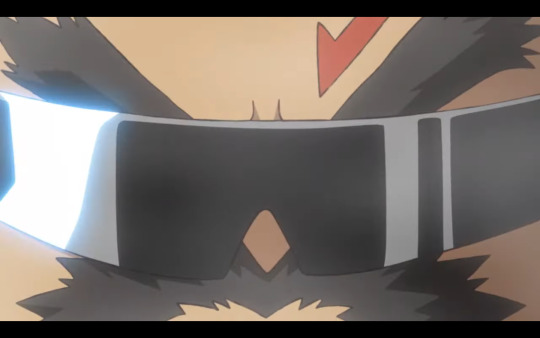
NANIMON!!!
My relationship with this guy is love-hate! I love to hate him x’D So I’m glad he’s back! Still want to see Piximon and Whamon the most but I’ll take it!
#digimon adventure:#digimon adventure reboot#digimon adventure 2020#fizz watches digimon 2020#digi spoilers#digimon
23 notes
·
View notes
Text
Miraculous Ladybug New York
The voices sound normal in French but seem so wrong in English and I don’t know what gives me this impression :/
There are a lot of things I loved in this episode/film:
First I’m glad the comic seems to not be canon anymore since it is Ladybug and Chat noir’s first trip to New York and they never met the US heroes before.
Cosmo Bug and Astrochat! I hope we will have a closer look and a longer utilisation in season 4 because this transformation looks so cool but was too short!
Miss Bustier being pregnant! So was she calling Miss because she is young and not because she is not married yet?
Marinette being to short to unlock the automatic door.
Marinette in denial with Adrien is just a friend, meaning Adrien was also in denial of his feelings for Marinette this whole time :D
A Black woman for the President of USA, the creators literally saying fuck the current timeline.
A black and a Native american girls as main US heroes (I mean they have most of the screen time of US heroes + about our heroes age) and a multiracial homoparental family. When Majestia says “it’s time to be our true selves” she isn’t only talking about Knight owl being a woman, but also about the both of them being a couple right? Maybe the Americans know Knight Owl and Majestia are going out but since they don’t know Knight Owl is a woman…
Adrien, aware or not, trying to be close to Marinette and knowing she did everything for him: making him come to NY, making the banderole when he left, etc. What if he changed target from Ladybug to Marinette?
Ladybug smiling fondly at Chat noir’s explanations at the beginning and accepting the flower.
Aeon stepping in front of Ladybug to save her from the Cataclysm. Imagine how Chat noir would have been devasted if he killed his lady D:
The Miraculous of the Eagle is the Miraculous of Freedom. Its power is to unlock whatever is holding back someone to reach their true potential, like fear, morality, etc. It’s like a big power up of what you would look like at 100%. Imagine Marinette if she is touched by this! :o no more clumsiness, only her confidence all the time!
I’m glad the Americans Miraculi are based on American Native culture. Meaning the Miraculous spread across the world are the sources of the local myths, legends and symboles. Ladybug’s box is from Asia. So maybe we will have a European guardian, a Greek one with Miraculous based on the Zodiac signs, as they are based on Greek mythology and constellations’ names. But also boxes based on Celtic and Viking myths! We will have a Shanghai special soon, so maybe the third World Special will be with the European box. I mean with Miraculous World could be film length special about other boxes just like New York and Shanghai are. Maybe they will make more like those, maybe one per continent (the crew talked about Brazil so a South America episode, so we would have an episode in Africa and Oceania! :D)
Adrien transforms in Chat noir just to protect Marinette. He makes his presence known in NY, with the possibility of Ladybug knowing of this, to protect Marinette.
Sabrina finding a life outside Chloé and maybe having a crush in USA :) Plus, it’s an interracial couple :)
Barbara x Olympia, the Supermoms of the ML universe :) So Jesse and Eon are sisters? Since they both called Barbara and Olympia moms? And that they seem together?
The little kitty to make Ladybug know if there’s a problem in Paris. I hope Marinette will make a ladybug version just so Chat noir can know if something is wrong in Paris so he could transform. You know, since they can communicate only if they are both transformed…
Did you notice the irony of Marinette makes Adrien coming in NY and then being mad at Chat noir for being in NY >< The reveal when they’ll realise all the quiproquos from the start xD
Other things I think wasn’t understood by most of the fandom and my opinion:
Mayura making an sentimonster looking like Robustus in Paris to make it seems Hawkmoth was still in Paris. But I don’t understand Hawkmoth’s plan to give a Miraculous to the villain. He never made a stupid move like than, excepting when he made a Miraculous the akumatised object for Queen Wasp.
Yellow roses symbolising friendship is a new symbole, but they do symbolise jealousy in the past. On the Internet, it explains it was to sell more of these roses they changed to meaning. So Ladybug and Chat noir were both right about it. Chat noir is trying to show platonic affection and support to Ladybug
Marinette going back to her antics like in season 1. Well, it’s not easy to move on from someone and Marinette never had closure to help her doing it. By that I mean a clear no from Adrien because she never succeeded to tell him what she felt so of course, she still have a little hope. About her antics, she tried so much to flirt with Adrien or to confess to him since 3 seasons/a year, she doesn’t know how to act as a friend with him, so she panics and here we go. Marinette has anxiety easily. So she has to plan every scenario/the worst scenario to reassure her. But being friend with Adrien is new territory. So Marinette becomes error 404 ^^ I mean, before she would have be thrilled to spend time with Adrien, especially sitting next to him on the plane like she was where they were on the train. But now that’s too overwhelmed for her.
Adrien wanted to tell Ladybug he’s going away too right away, but Plagg told him not to, because he wants his friend to have free and good time too because Adrien deserves it. Maybe they would have find a solution like the Horse Miraculous or going back to Paris thanks to the astrosuit.
I think Ladybug say she can’t trust Chat noir anymore out of anger and doesn’t really mean it. We know she cares about Chat noir
About Chat quitting. It’s not because he came to NY without telling Ladybug, I think the main reason he wanted to quit because he could have actually kill someone. We’re talking about Adrien the cinnamon roll. Do you think about how traumatic it would be to kill someone? By accident, yes, but the consequence is still here and the person would have been an innocent. He would have kill Ladybug if Aeon didn’t intervene and if she wasn’t a gynoid, she would have die for real. Maybe she knew she’ll be fine thanks to the Miracle cure or she just wanted to save a human life. So it’s the combo of nearly kill someone + Ladybug won’t trust him anymore that makes him think he’s not worthy of being a hero anymore.
I read people complained about Ladybug being perfect and awesome. Just wanna remind it’s from Adrien’s point of view, just like Adrien is perfect from Marinette’s one. Not that they’re perfect as people, but the other see them at such for them. When you’re in love you don’t see the person as perfect as a person, but as your partner because they are what you’re looking for in a partner. Adrien likes strong girls, with confidence, who want to fight for others and help them. Marinette likes boys who are gentle, sweet, generous, romantic, calm and relax to counterbalance her ball of energy. That’s why they see Ladybug and Adrien are perfect according to their standards.
I’m not sure where Adrigami and Lukanette are… The second one seems to be in standby, Luka giving Marinette time to move on from Adrien and I stand that. Maybe the first one is processing thing, Kagami also giving time to Adrien to clear his heart. We didn’t hear Adrien’s clear answer since the finale. Or are they secretly dating because of their strict parents? The kiss seems to be on the cheek (pretty close from the lips from our point of view, but still not on the lips) so I don’t think they are dating yet, so the Adrinette was cheating? I don’t even think Nino and Alya know about them or Adrien knows he’s in love with Marinette or that his behavior makes it appears like such. He wants to spend time with her, to be with her, he’s thankful of her, wants to protect her, but still processing his feelings. Kagami and Adrien never had friends before, least of all a girl/boyfriend. I’m not sure they know what dating supposes to look like. Maybe Kagami confused feeling closed to Adrien because they live the same situation and being in love with him? I love Kagami and Luka but I know Adrigami and Lukanette won’t be endgame anyway so I try to not bring myself to much in those ships… But I hope they will end up with each other!
Adrien isn’t a cheater. First, we don’t know yet if Adrigami is dating or not. Plus we see Adrinette interactions are romantic because we know they’re endgame and we know Marinette is in love with Adrien. (I’m not even sure Adrien is conscious that his behaviour could be interpreted as romantic.) So it’s just our perception that makes those moments romantic. Otherwise, Adrien did nothing wrong! What did he do? He was happy to be sitted next to a friend so he won’t spend a 12 hours flight alone (not like he can talk to his bodyguard or Mendeleiev...), thanked Marinette for made him come to NY, hugged her, helped her with automatic doors, hided with her because they were sneaking out, share a hot dog and they have been locked in a room. Yes, they danced but it was Alya who asked Jess to turn it into a slow. And dancing with someone else isn’t cheating anyway.
About Alya and Nino… Alya knows Marinette is in denial of her feelings and she might be frustrated because to her point of view, Marinette is giving up without a clear answer from Adrien. She didn’t know Adrien told her he’s in love with a girl (Ladybug, in Pupeteer 2) and from Marinette’s POV it’s Kagami who is also in love of Adrien. That’s why she stepped back in the S3 finale without knowing Adrien might have giving up on Ladybug (because she told him a clear no) and is trying to be closer to her. Alya doesn’t understand why Marinette is giving up on her feelings and from her and Nino’s POV Adrien is also crushing on her but isn’t aware of it and/or doesn’t know it’s reciprocal. From their POV, it’s like Marinette’s one on Adrien and Kagami: they both think Marinette and Adrien are in love wih each other but not aware of it. Alya isn’t giving up on Marinette because she think she is so close to hapiness and reciprocal feelings to give up just now.
New York being romantic… Well maybe it’s Hollywood’s fault and since a lot of French never went to USA, their only views of this country are films and series so their opinion might be biased? (Just like people think Paris is romantic when… it’s maybe not true anymore… It’s not the City of lights from before…) Same for USA being the country of freedom. It’s just become US save the world in every of their movies, against terrorists or aliens or whatever.
About Nino calling Adrien a baby chick, a little cultural explanation is needed here :) Chicks have not the same meaning in French than in English. While in English it refers to girls in a sexual/flirting way, in French it’s a cute pet name you call your child or a cheesy one for your boy/girlfriend. So Nino refers to Adrien as being innocent, like in a naive and oblivious way.
Too many heroes in NY. It seems Hot Dog Dan and the firelights heroes are recurent NY heroes. But the other ones could live elsewhere and just come to NY because there were a big threat wih Techno Pirate. Since United Heroez are based on Justice League and the Avengers (or other groups of heroes, but I would say mostly the JL), they could have way to communicate and to travel fast across the USA right?
Questions:
Where are the power of the US superheroes come from? From the bracelets?
Why Jesse and Eon have to supervise the Miraclass? Does Olympia and Barbara know Marinette and Adrien are Ladybug and Chat noir? Nope, they were surprised they are in NY. So why? To be sure they’ll be safe since they are a lot of supervillains in USA? (Since you know, they’re not a one-time villain because of an akuma here)
Was it Aeon’s fault if the door didn’t open for Marinette and Adrien? Or it’s really because Marinette has the size of a child? xD By the way, do the US door retract when they meet an “obstacle” or it was just for the comedy?
Am I the only one who think Aeon look like an Egyptian goddess in her hero form?
Tsurugi-san (forgot Kagami’s mom’s name) should know Gabriel is Hawkmoth, or at least he’s in NY because he is driving in a autopilot car from Tsurugi’s label. There is something going on between her, Gabriel and Audrey (see the end of the episode Feast).
We see Adrien protecting Marinette a lot during attacks. Is this a building or a foreshadowing of him realising he’s in love with Marinette (I mean being conscious of his feelings) because he will see her hurt during a attack? (Marinette could be fine, transforming in Ladybug just before being really hurt or killed by something but Adrien won’t know Ladybug next to him is also Marinette so… angst and tear?) could be Adrinette or Marichat but this scenario could also be a reverse with Ladynoir. Marinette seems to be more and more fond of Chat noir with time passed.
With the special, I think the love square would be changed in S4. Chat noir still cares about Ladybug but he’s not pursuing her anymore. So still banter but not flirting for ladynoir? But Ladybug makes heart eyes when Chat noir gabble about flowers and their symbolism :3 I don’t know if Ladybug will see Chat noir romantically but they may have an even stronger bond after all they have been through! So reverse Adrinette like in the special? So maybe... more Marichat? :D
Well that’s all I thought at the moment. Maybe I’ll add new things when I rewatch it for the x times. If you have language or cultural questions, don’t hesitate! I will add the answer to this post! ;D
38 notes
·
View notes
Note
So I've heard the parley scene in AM is really bad. Can you explain what's wrong with it?
This sounds like a good time to use that handy event gallery feature to transcribe the conversation so we can talk about it. I haven’t done a full line-by-line reading of anything in a very long time.
Incidentally, Hubert is also present in this scene although he has no lines, which is highly unusual for the way this game handles who appears in story cutscenes. I just thought that was worth remarking on.
Dimitri: Professor. Do you think Edelgard will show up?
Byleth: “She will.” or “I doubt it.” Choice leads to...
???: “Well, well. It’s been a long time, Professor. And hello to you too, DImitri.” or “Sorry to disappoint you, Professor.”
This is Byleth’s only line in the scene, and I love how it reinforces that Edelgard is hung up on them even in the route where Byleth matters least. She acknowledges Dimitri, the leader of the army with whom she’s holding a parley, second - and not at all if you doubt her and she gets pouty about it. Also, imagine a Byleth-less AM where it would Dedue at Dimitri’s side instead, and how much better that would have been.
Dimitri: Edelgard. I did not think you would actually accept my request.
Edelgard: Call it a whim. Well then? What did want to talk about?
Call it an OOC whim, because she never so much as suggests any such thing on the other routes even when she’s losing.
Dimitri: I will get straight to the point. Why did you start this war? There had to a way change things in your territory without the need for so many senseless casualties.
Edelgard: It may be hard to believe, but this is the way that leads to the fewest casualties in the end. Don’t you see?
Dimitri: How could I? Countless people have already lost their lives in this conflict.
Edelgard: The longer we took to revolt, the more victims this crooked world would have claimed. I weighed the victims of war against the victims of the world as it is now, and I chose the former. I believe that I have chosen the best path, the only path.
Dimitri: Even after seeing the faces of those who have suffered the ravages of war, you would still force them to throw their lives away for the future? You are obsessively devoted to this war and deaf to the screams of its victims. You cannot change the cycle of the strong dominating the weak with a method like that.
Edelgard: You’re wrong. That very cycle is exactly what I have devoted my life and my power to destroying. If after all of this you believe the weak will still be weak, that is only because they are too used to relying on others instead of on themselves.
This reinforces three concepts central to Edelgard’s character: the ends justify the means, dependence on others makes you weak, and it’s acceptable for her to make life-or-death decisions for an entire continent because she has the power and (allegedly) the understanding to do so.
Dimitri: Yes. Perhaps someone as strong as you are can claim something like that. But you cannot force that belief onto others. People aren’t as strong as you think they are. There are those who cannot live without their faith...and those who cannot go on once they have lost their reason for living. Your path will not be able to save them. It is the path of the strong, and so, it could only benefit the strong.
Dimitri remarks that Edelgard is operating from a place of extreme privilege as emperor, but he also means strength in a different context which he’ll expound upon later. I’ve seen people cherry pick the line about people who can’t live without faith as evidence that Dimitri thinks religion is necessary, but that’s ignoring what he says below.
Edelgard: Heh, so you consider me strong, do you?
Of course, because Edelgard makes a big point of never showing her emotions to anyone but Byleth and projecting an image of strength in place of them. This is markedly in contrast to Dimitri who allows himself to be publicly vulnerable in ugly and unsettling ways. It’s inverted gender coding twice over.
Edelgard: Even if one clings to their faith, the goddess will never answer them. Countless souls will be lost that way. Living without purpose. And I can be counted as those who have died that way as well. But that’s why I must change this world, on behalf of the silent and weak!
So now she claims to speak for the weak. This implies some interesting things about why Edelgard is an atheist (or as much as one can be in a world where your deity is living inside your teacher), although it falls a bit flat when one considers Dimitri’s Goddess Tower event where he essentially admits to being a deist himself. They’re actually about on the same page there, but this conversation doesn’t indicate it.
Dimitri: And do you intend to become a goddess yourself? Will you steal the power to take action from the broken-hearted masses you claim to defend? The ones who can truly change the way of the world are not the rulers, but the people. Pushing your own sense of justice and your own ideals onto even one other person is nothing more than self-righteousness.
Edelgard: Maybe it is self-righteousness, but it doesn’t matter. Someone has to take action and put a stop to this world’s endless, blood-stained history!
Proto-democracy alert, and I don’t mean from Edelgard. I’m a bit shocked that Edelgard is willing to admit that she’s being self-righteous, but she immediately pivots back into her usual spiel and refusal to compromise her beliefs even the slightest.
Dimitri: Do you not believe in the power of the people to join together and rise up? Humans are weak creatures. But they are also creatures who help each other, support each other, and together, find the right path. I have learned that humans are capable of all that from the professor...and from everyone in my life.
I hate that Dimitri singles out Byleth here and not, you know, any of the numerous other people who’ve been at his side supporting and loving him for much longer and with more than just irrelevant dialogue options and vacant smiles. Nevertheless, Dimitri understands the value of community on account of his experiences and his own development. That’s some solid, thematically cohesive writing there. See what the other leaders miss out on by never changing during their stories...and no, having the hots for the self-insert does not constitute changing.
Edelgard: I doubt a highborn person like yourself could know how the poor feel or what motivates them. This is nonsense. Though, I’m finally starting to understand how you feel. But that makes it even clearer to me that we can never fully understand each other.
Dimitri: I feel the same. I finally understand...what you believe is right.
An obnoxious moment of the pot calling the kettle black that also ignores that Dimitri spent most of the timeskip homeless, spending time in the slums of Fòdlan, being hailed as a (frightening) hero of the common people. Dimitri doesn’t argue the point though; he sees that Edelgard is set in her (demonstrably incorrect) beliefs and that further discussion is useless. Do note who shuts down the conversation first though, after sidestepping Dimitri’s point about the value of supporting each other.
Edelgard: Good-bye, DImitri.
Dimitri: Wait, Edelgard. There is something I must give you. This is for you. Use it to cut a path to the future you wish for. And I will rise up to meet you there...El.
Edelgard: ...
I left this bit in for the transition as well as to undercut the irony of what Edelgard ultimately does with this dagger. The future she wishes for is to stand on her own - even if it means killing an old friend and dying herself.
After this the scene cuts to a flashback of Dimitri giving Edelgard the dagger before she left the Kingdom, followed by Edelgard admitting that she had forgotten that memory and the two of them reflecting on it briefly before parting. I’ve cut this part as it’s not relevant to the parley.
Now that I’ve written it all out I have to say that the scripting of this scene is not inherently terrible. It works if you assume that Edelgard is metaphorically sticking her fingers in her ears through the whole thing and spouting her rehearsed, blatantly flawed rhetoric about human nature and assumptions about Dimitri’s character that prove that she doesn’t know him very well at all and doesn’t care to. I’ve read that several lines are markedly different in Japanese, although not necessarily better? Either way this is a scene of two people talking past each other repeatedly that accomplishes nothing except to set the stage for the final cutscene, underscoring that AM was never really about politics so much as people at its narrative center.
#Fire Emblem#FE16#Fire Emblem Three Houses#Dimitri Alexandre Blaiddyd#Edelgard von Hresvelg#Azure Moon
141 notes
·
View notes
Text
Cardfight!! Vanguard Extra Story IF 17—19 things
feat some overdue screaming
IF 17
said overdue screaming
Without the context of epi 19, Kourin’s reference to original memories stands out as incredibly peculiar. Miwa’s response, while fitting for anyone else, could have an entirely new meaning after the revelation at 19′s conclusion, we’ll get there in theoryland.
Never knew needed Kai-kun working part-time jobs but it has become a huge need, thanks writers.
That’s gay. But it does suggest that the possible ruptures in IF’s reality aren’t isolated to Shin and Kamui in the previous episode. It would be nice to see any other instances from the possible ripple effect.
pre-19: “oh this face is a mood”. post-19: “different character but hmmmmm”
With all the Legion Mate comparisons floating around from the get-go, Naoki’s method in tackling his regret is an intriguing choice against his past efforts. In Link Joker, Legion Mate and the second half of the manga/Reboot, Naoki’s objective was to make for his inaction going forward and earn Aichi’s forgiveness. If given the opportunity to go back and redo things, he may have taken it, though having heard from Aichi personally that he’s thankful for everything and everyone that he’s connected with as a result of how events played out, Naoki may not have had the heart to do so. Without that talk, it’s natural that, instead of looking ahead and atoning, Naoki’s turning backwards, it’s a neat contrast.
The series has always built up the relationship between Aichi and Blaster Blade but the relationship between Kai-kun and Dragonic Overlord is so precious, it’s a shame that it wasn’t delved into prior to the past couple of years. The notion of evolving circling the both of them is incredibly fitting, with the history they’ve had in both continuities and the duality of their approaches. (It might have been occupying thoughts a lot since, the scene was so poignant).
Between his soldiers attacking during their first (onscreen) attempt to reach the root of the problem and Emi’s subsequent admission, props to Aichi for isolating it and cutting it off to anyone that tries to interfere, hoping it’s a part of any explanation to his reality warping (assuming it was him, until today, it seemed the only viable reason).
The comparison between Naoki and Kai-kun had me believe the former might join up with the main party as a nod to being there by the latter from beginning to end of Legion Mate, being both characters harbouring regrets (if Kai-kun were to regret that his IF life takes away from the happiness of the Outside World characters).
I just really, really, really love this scene. That is all.
Bless for highlighting the irony in the KaiAi units being adversaries.
Did I mention this is joint-favourite IF epi with epi 7? It’s not, it is and here’s one of many reasons why.
Reason #57 why: the battle choreography.
“Aichi Sendou isn’t the one you want to save”. Makes you wonder who was out to save the object of their regret and who was out to save themselves.
For a moment, had believed Naoki was not-dying (Retiring?) and being returned to the Outside World, somewhat surprised it hasn’t been utilized more beyond the Ultra Rare teams diving into the Akashic Book from.
Very Soft Cardfight. That is all.
Somewhere, original continity Naoki is screaming.
Tell this to your Link Joker self, please.
IF 18
On the one hand, Kai-kun walking around in Miyaji (with or without the context of IF), on the other hand, Bushi Eats.
Probably due to cracks coming from him getting a glimpse of the original reality, but Shingo cares an enormous amount for someone who, just a couple of episodes ago, said all the products in Card Capital were going to make him lose his mind.
“Awful big brother”. Laughs with shovel. (Comparatively, he’s brother of the year.)
PEDAL FASTER.
Love how Masaki and Shinji are named to overlap with their brothers’.
He’s going to fucking murder you.
[Kourin voice] Aichi is tired. [Me voice] As am I of your bullshit.
Wingal took so much time to train that it was only on his third appearance that he didn’t attack anyone. Also soft? So very soft.
NO THAT’S SO CUTE DAMN IT.
I have so much to say about Aichi missing Emi but also she’s barged in twice and you blasted out our of the castle on both occasions. Bullshit.
Do not pull the Legion Mate with me, boy.
Is he super dissociated because how do you even in the face of this?
It’s not just that he shouted her name, but the tone of his voice shouting at her. Thinking about just how extreme it is in comparison to the Aichi she knows and has kept company is pretty chilling.
Just how aggressive Aichi has become within the IF World is alarming; on only two occasions has he let anger get the better of him and one of those two wasn’t so bad. If this is to play on how warped he was going into the fight with Ibuki, good play on the writers’ part.
Semi-related to the above; with exception of three characters (Emi, Rati and Voidkuto), Aichi’s always used honorifics, and attached one to Kourin’s name, so to hear him address her without one is jarring, for lack of a better word.
THE BIG RED FLAG: Aichi’s expression in seeing Kourin having acted of her own accord (and potentially disobey him) smacks of two things: — his perceived crumbling control over the Sanctuary Knights, coupled with Naoki and Shingo’s desertion (his lack of reaction to the latter is bizarre, as it lends itself to and could bolster his hatred of Vanguard) — insinuates he never had control, but was allowed to think that he did. There’ll be a section beneath 19, which itself does a lot to fuel the flames of this suspicion, that will consolidate thoughts and the theory that’s been brewing since this episode last week.
On the subject of 19, Miwa being so nonchalant and passive about everything makes a lot more sense.
Let the girls fight physically more.
UBW Archer Class Meme-y Dialogue tingles.
Naoki and Shingo holding down the fort is very sweet, particularly when Shingo was alone in that task last time.
IF 19
Alarm bells rings first thing in the morning.
The irony in past Ibuki preventing Kai-kun going to Aichi after the past dozen episodes, there are no words.
Odd that the caveat of meeting yourself from another point in time presents itself when it didn’t occur in the first two episodes, unless, at least in this case, it applies only to past events.
There’s trying not to yell FGO at things and then there’s brain yelling “Lostbelt!” at Ibuki.
Rekka and Ren’s appearances gives me hope they’ll resurface; the main characters and audience know where their target is, so would like to think word will somehow get to them. (Speaking of. Nome? Where the fuck are you during all this?)
Episode loves playing with unsettling sights, very fitting for messing Ibuki’s head around, but simultaneously, making it apparent just how much of a threat Kourin specifically is. — On a related note: Kourin beats out Ren, Leon, Sera, Voidkuto and IF Aichi to have the most nightmarish face and I Am Afraid. Give Aichi a face like that al you’ll irreparably wound my psyche.
Intense Vibrating. They’re setting up Ibuki’s Deleting Aichi is relevant, it was the only one Kourin didn’t touch on in the episode and I am burning.
How dare you montage their time together with that music and then cut to this!
Did everyone else forget Jammers were a thing or was it just me being dumb?
Everyday I relate to Kai Toshiki.
Just going to appreciate Kai-kun gushing over giant robots in the middle of battle.
Kai-kun!Blaster Blade vs Greion giving me intense flashbacks to Aichi watching Kai-kun’s image in Blaster Blade sacrificing himself to try and fend off Greion just before he got Deleted and SCREAMS. — Once that fight is brought up directly, if you listen, you’ll hear Rena screaming in the distance.
If there’s anyone who has no room to talk it’s Miss This Thirsty For Aichi. Also when did you two switch places of tease and teased?
“Oh shit, he’s going to Delete Kai-kun”. “Oh okay, false alarm, thank G—” “OH NO SHIT HE’S ACTUALLY GOING TO DO IT!” — On an actual note, seeing the three regrets prominent in this season all take separate routes is interesting; Shuka working to correct her wrongs in the present and moving ahead, Naoki trying to travel back and alter things from the point of origin and Ibuki being twisted to no longer feel regret, seek repentence and rather to repeat his actions. — Ibuki vs Aichi flashbacks intensify. — Also, mid-fall dab.
Double Agent Miwa is a blessing, who knew his acting skills were so good? Although the begs the question (if he was flat-out planted as a mole) how he earned Kourin and/or Aichi’s trust to become a Sanctuary Knight in the first place
IF 20 preview: HYPE! HYPE! HYPE!
Theoryland (Screaming):
Miwa being Takuto or Nome’s Outside World partner:
In both Rekka and Suiko’s cases, there was a companion venturing in alongside them, both of whom are friends of Kai-kun and the same age. Perhaps, Miwa may have been in league with one of the Tatsunagi brothers (having determined Aichi’s motivation and Kai-kun’s position in all this, calling on his closest friend to match the girls’ partners) through whom he gained insight into the situation and moved in order to protect Kai-kun; working from the inside to weasel information out of the others, understand how they operate, monitor their activities to keep Kai-kun out of their sights, (find Takuto, if with Nome) and maybe (find a means to or actively make an effort himself to) drag Aichi out of his current state. It may be that, instead of Sanctuary, his abduction of Kai-kun had the destination of a rendezvous with Nome until the girls’ interference and the entire incident went off the rails.
Aichi as a puppet king and Kourin the true human antagonist:
Since his expression in seeing Kourin on the offensive without his say-so, it’s been on my mind that Aichi hasn’t actually been in a position of power whatsoever throughout IF, but he’s been led to believe he is, and the act might be withering. As "original" memories factor into it and Ultra Rare’s were lost at the end of the main Reboot continuity plot, it’s possible they may be on the line as they were in Link Joker/Legion Mate. — As she’s aware there are such memories, it’s possible that they were triggered into resurfacing when Takuto appeared within IF World and encountered her and Aichi, leading to his capture and confinement, so as not to cause any further damage to the world fabricated. — Alternatively, she might be acting in order to keep the force (a Brandt remnant remains my personal suspicion) that has Aichi in his current state at bay. Her unease in seeing him hanging above the scene outside Sanctuary as she attacked the others might suggest that she was worried it could break loose, as she’s never been one to be rattled. This is why “human” was specified above, because whatever the case, any corruption in Aichi is evidently the overarching antagonist force.
Additionally, throughout the season, Kourin has been fiercely territorial around Aichi, speaking and acting on his behalf, while keeping the other Sanctuary Knights at an arm’s distance. She alone enters his private quarters, sees him in pain, and (no, haven’t given up entirely on the right eye thing, there have been other people around when he’s outside his Alfred form and it was visible) privy to any secret circulating him (as well as IF’s true nature), while keeping the others in teh dark. Her reasoning may be wanting to keep him under he thumb or prevent whatever’s inside/in control of him from running rampant.
And in regards to Ibuki, Aichi made the declaration about casting him elsewhere, but Kourin was the one who enacted it, and the sole player in manipulating him to switch sides. There’s no certainty that Aichi is even aware, much like he might not be conscious of Naoki’s betrayal. — Her being responsible for recruiting might also explain why Misaki was never a Sanctuary Knight: Kourin desired she have an ordinary, happy life, not unlike Aichi’s wish for Kai-kun.
In a truly ironic turnabout, it looks to be that Kourin is IF’s Sera.
7 notes
·
View notes
Text
Norse Read-A-Long
Week 1
So the prompt I'll roll with is
5. Why do you think Hallstein Thorolfsson was so adamant about not accepting any land granted by his father?
though... I'm going to ramble about a bit.
I want to riff a little on Harald Finehair, aka Fairhair in some translations, because he shows up as a sort of Lex Luthor character in many of the Icelandic Sagas. While the sagas will typically deal with the trials and tribulations of people and communities within Iceland itself, Harald is a shorthand for the big, bad enemy that is Norway.
Of course, with all things Old Norse, there is debate as to whether Harald Finehair actually existed or was a literary amalgamation for the sake of a cohesive oral tradition. I'll continue on as though he were real, since as far as the sagas-as-stories go, he's as real as Lex Luthor is in the DC Universe.
So what does this have to do with Hallstein? The "historical" backdrop of the settlement of Iceland gives us a good framework to build profiles of the mindset of the characters presented to us in this prologue to Eyrbyggja Saga. Having an understanding of what was culturally, morally, and socially acceptable and commendable helps to put context to a [SPOILER] upcoming battle spurred on by Dritsker for instance (which, if translated with an eye to connotation, is better understood as "shit-reef" but I'll take a page from the Saga Thing guys and refer to it as Poop Rock as it comes up).
So what kind of people can engage in battle over something called Poop Rock?
Much of the drama in the sagas tends to be a commentary on the flaws of the rules, laws, and norms that structure Icelandic society. While the conflicts in Eyrbyggja saga are more subtle in how a small issue can erupt into brutal violence, other sagas will more visibly display how laws and social expectations can gridlock people into a vicious cycle of feuding.
The Old Norse world was driven primarily by honor and reputation, as illustrated in Hávamál stanzas 76-77
[76] Cows die, family die, you will die the same way. But a good reputation never dies for the one who earns it well.
[77] Cows die, family die, you will die the same way. I know only one thing that never dies; the reputation of the one who's died
(trans. Jackson Crawford, The Poetic Edda. 2015)
Self-sufficiency, responsibility, and keeping oaths were the core mores that could hold a community together while allowing individual freedoms. Holding court, or a thing, could be a bit of an ordeal, and while Icelanders loved litigation, problems were often solved on a one-on-one, or family-on-family, basis, sometimes with lethal resolutions. The law was typically an "after-the-fact" event, due to travel and seasonal constraints, and was usually a matter of damage control moreso than damage prevention. As such, much of the functioning of society was up to individuals, for the most part, behaving civilly.
This is why there's a certain attention to detail in the passage
On this platform lay a solid ring weighing twenty ounces, upon which people had to swear all their oaths. It was the business of the temple priest to wear this ring on his arm at every public meeting.
(trans. Pálsson and Edwards, Eyrbyggja Saga. 1972)
in the description of Thorolf's temple to Thor at Hofsvág. Oath rings pop up consistently enough in the mythology and the sagas that we can be pretty certain they were a Big Deal and that oaths were taken very seriously, and being sworn in public assemblies, whether at a temple or a thing or, eventually, the Althing, kept the oath-sworn accountable in society.
The wrench in the gears comes mostly from the cultural heritage of Iceland's initial settlers.
Norway, back in the 8th to 10th centuries, was a collection of scattered, independent kingdoms, or chieftainships, governed by very locally minded chieftains, jarls, goði, or other such self-determined titles. Harald, as the stories usually go, had his eye on a woman, Gyða Eiríksdóttir of Sweden, but she refused to marry him unless he had united all of Norway. He swore to this, and part of that being he wouldn't cut his hair until all of Norway was under his control, and so got the nickname hárfagri (fair, fine, or beautiful hair).
There are political arguments offered for this mission, aside from marrying the popular girl, in some sources. Since most of Northern Europe was being Christianized, and Christian kingdoms had this pesky tendency for organization, cooperation, and concerted military endeavors due their new-fangled literacy, a unified Norway stood a better chance of surviving incursions from the continent. (And if I recall correctly, even Sweden was semi-unified at this point.)
The problem is that many of the jarls, goðar, etc. were not keen on giving up their own independence and authority. There are stories that display a certain irony in many separate lordships allying in order to better fight off Harald's advances (which, really, just proves Harald's point), but highlights that the mentality of Norwegian nobility was that cooperation could be advantageous, but should be temporary. Debts are paid as needed and independence is maintained. Eventually, as Harald began to gather more supporters under his banner, his campaign snowballed until the hold-out nobility couldn't fend him off neither individually nor as small alliances, and many chose to flee with whatever assets they could carry than bend to the will of an overlord.
While the story of the settling of Iceland is that of a predominantly Norwegian diaspora we shouldn't imagine these settlers as poor, dispossessed pilgrims, but of a noble elite loading up ships with riches and family and staffing. These are people that are accustomed to power, authority, and self-determinism.
So Hallstein Thorolfsson, while being offered land from his father, struck out to stake his own claim for a couple of reasons. Firstly, they were in a new land that was mostly unsettled. Hallstein didn't have to be confined to what he could inherit from his father. There were no neighbors to constrain his borders, and by claiming his own stake, no one could say of him that he only succeeded because of what he was given. He carved out his own home, his own destiny, and could rightfully say he was a self-made man.
Secondly, much of what kept people, especially the nobility, in check was a sense of debt, both financial and abstract. It's not far-fetched to overlay a Godfather-like stereotype over the goðar ("Someday - and that day may never come - I'll call upon you to do a service for me. But until that day, accept this justice as gift on my daughter's wedding day."). The sense of not owing anyone anything for your success was a key part of the honor system that kept people accountable. The same logic that drives Hallstein to forge his own territory; to not piggyback on his father's power, to not owe his father anything for his own success, is that need to be neither beholdened nor indebted to an overlord king.
5 notes
·
View notes
Text
Some Thoughts On Taking Over The World
Taking over the world is a trope that’s amused me for years. Or taking over a country, or a galaxy, or a continent, or a kingdom of any size, or whatever. It’s a staple of villains everywhere, both in fiction and out. The problem is that so few of them would really know what to do with the world afterward.
Oh, some of them have plans that give them a decent reason to want to do that. They think they can Make Things Better. Or they already rule something and want to extend their territory. Or they really just want use the power to destroy everything, which is a bit of a different trope altogether. Whether they’d actually be able to Make Things Better, or should extend their rule, are other debates entirely. At the very least they have a plan for afterward, and that’s Good.
But the ones who are just greedy or just want to conquer? I often wonder what they’d actually do with the world once they owned it.
Consider: it’s easy to say one wants to be a dictator, and another thing to do it well. Most fictional villains only look at the short term - if they rule poorly, then who cares, the people can be subjugated by force and the pathetic little rebels who spring up can make sure the Evil Armies get some exercise. Long-term, however, resources get depleted, people die, and the entire enterprise rots from the inside. They can extend their own feeling of wealth and greatness by demanding more from the people, but eventually a critical point will be reached. The rebels will grow more desperate and powerful as they gather support, surrounding powers (if they exist) will see the villain’s property as easy pickings where the people will downright invite them in, resources will deplete (both human and otherwise), and everything will fall apart leaving the villain with nothing in a fit of cosmic irony.
Assuming the villain in question doesn’t want to end up with a dying kingdom, though? That’s going to be a lot of really boring work. Running a government requires worrying about a lot of tedious stuff like laws and regulations and maintaining public order. It’s all fun and games until economics and infrastructure and occupational health and safety become your problem to solve. Their new empire is going to be less about reclining on pillows while being fed grapes by beautiful people and more about approving minutiae and long lifeless meetings about the state of affairs, unless they have competent people they trust to handle things without them. Trust, however, isn’t something villains tend to have in large amounts. Maybe the monotony will be broken up by making speeches and getting a lot of applause, but most of their life isn’t going to be that.
Even assuming these hypothetical villains do happen to have people they can fully trust to handle things without betraying them? If they choose to leave the place in the hands of those people and run off to do other things, that highlights how much they don’t actually want to rule the world. They just enjoy the process of getting it, not keeping it, and it’s a bit of a disappointment to everyone involved when they actually succeed. If the villain is lucky, they’ll be good enough to hold everything together while continuing to conquer, but the boring parts will always be there to distract them from the “fun” parts. Unless they’re a genius who is brilliant at multitasking they’re likely to end up messing up at least one of those careers that they’re trying to balance.
Occasionally - and this is very rare - the villain in question successfully takes over and runs the place decently, and chooses to be satisfied with that. Most, however, seem to forget one thing: in almost all cases, they’re going to die eventually. The more the “decent” state of affairs relies on the villain in question to be present and in a state of good health, the more likely it is that it’ll all fall apart once they’re gone (or incapacitated). The less it relies on their personal existence, the more likely they are to render themselves irrelevant or reduce their own power, which is generally not the goal. Sure, they could leave the place to other people, but there’s plenty of historical examples of a genius ruler leaving their empires to others and everything falling apart because the people they left them to weren’t geniuses. See Alexander the Great’s empire as a real-world example of this (as well as an example of a genius who managed to continue to conquer and rule decently at the same time).
Maybe it doesn’t matter, and the villain just wants the world now and doesn’t care what happens afterward. But most who are content to settle down and rule tend to want their changes to stick. So, in the end, the best-case scenario involves either finding some miracle system of government that keeps themselves relevant while easily adapting to whatever fools are left in charge when their time is up, or finding a successor who’s up to the challenge of continuing their work, both of which pose their own unique difficulties.
TL;DR: Taking over the world is the first step, and everything afterward is probably going to be disappointingly boring, difficult and terrible in comparison. It’s probably worth asking whether it’s worth the trouble.
12 notes
·
View notes
Text
Types of Cultural Dissemination for Laymen
If you won’t bother reading the profile, and the previous posts, I’m going to introduce myself again. I’m an anthropology major, and short of Calc I for my degree. (which I’m miserably failing and I don’t need). For my BA I focused mainly on systems (racism, sexism, etc), but my true interest is in media exchange with systems. i.e. trade of things like movies, books, and seeing how they are interpreted in the country of origin v. internationally and how they might be reinterpreted, etc with a focus on say... gay people. So say, how Sailor Moon views gay couples and how they are represented versus how say, Sailor Neptune and Sailor Uranus were made cousins for the sub and why that might have changed for the DVDs. No one was interested in something like this though, since we’re still stuck with Eurocentricism, even though I did a paper for my high school’s senior thesis back in 1999. (It’s been a long road) As such, I know the internet loves, loves to confuse cultural dissemination terms up, and make it super simple, but it isn’t. And last round of me doing this essay had it stolen, so, in respect to that, I’m going to be giving my profs credit for their ideas, so if it does get stolen (again), at least SOMEONE will get credit. (maybe, hopefully). So I tip my hat off to:
Wendy Fonarow for the basic analogy of the house for imperialism.
Also Eric Johnston for the physical Anthropology parts of the article.
Lilith Mahmud for having an awesome class on systems and power struggles.
Jerry Won Lee for being really good at talking about Korean history and its relations with the US.
Eleana Kim for doing studies on Korean adoptees and economics of that.
And James Egan for teaching about Economics and various types of reciprocity and exchanges. (He’d also credit Marcel Mauss’s work on reciprocity.)
I ask, if you don’t credit me for this, you at least keep in their credits. Though it’s pretty much a terrible move to appropriate an essay on the subject of appropriation in the first place. Also, any mistakes made aren’t their fault since I compiled this myself. I apologize to them ahead of time if this is the case. But please please keep the credits. If this essay is so good, to be stolen, at least have respect for them.
Basic terms:
Cultural Dissemination is the spreading of culture to one place to another either by mutual, imposed or invited consent.
There is an essay (which I know my professors would chase me after to cite... but I disagree) about how Nationhood is more recent, so ideas of “imperialism” and “appropriation” are more problematic for time periods roughly before the 1400′s (probably a mistake on the dates). But I’m still a bit skeptical about it being so widely accepted since there’s historical evidence for the idea of sacrificing yourself to the state going way back in human history (They would point to the rise of agriculture, mainly) and the essay is widely Eurocentric with no one questioning this fact. So while we don’t have specific dates for the following things, I’m going to probably simplify it in ways my professors are going to hate me for and mark me down for. But then this isn’t a paper for them. Types of Cultural Dissemination
Cultural Exchange- basically, this is your trade. Someone comes up with a cultural good, you share it with them, and you think it’s a great idea, so take it back and keep it as it is and then give them something in return. Trade, BTW, goes back to Homo Erectus, so humans didn’t invent it. There is evidence in a Chinese cave of rocks from Africa (yes, I know that Africa isn’t a country, but it also got sliced and diced to smithereens, so in respect to that, that’s why I say Africa, the continent) that must have followed a trade route. Granted there is debate whether it was someone traveling from Africa specifically to that location or if it traveled more slowly by local trade. (Credit to Johnston for this). The idea that Homo sapiens sapiens invented trade, and specifically Europeans is pretty ridiculous. We’ve always traded from the beginning.
Cultural Adaptation (as a sub category of Exchange)- If something exchanged is adapted to the country in its own unique way because of exchange over a long period of time, that’s Cultural adaptation of the object. And no, I’m not saying cultures get “better” with this term. There is no such thing, they change, but the needs from that object when embedded into a culture might need to change. So chopsticks and how they are used is slightly different from China, Korea, Mongolia and Japan, so since they became a part of how to eat food, their design is different. (There are youtube videos on why, etc) Cultural Sharing or Cultural Invitation- is one way. (Cultural sharing is used more than cultural invitation, but I think Cultural invitation is more precise). I invite you to learn about how I do things and participate. Like learning how to make kimchi or soy sauce. But I also expect that once you have this knowledge, you won’t backstab me later after all of that emotional labor put in. Cultural Appreciation- Look, don’t touch. Basically the museum model. You don’t try to steal the painting off the wall and then take it home and claim you painted it. You look at how its curated and appreciate it for where it is (Yes, I know about museums appropriating objects... we’ll get there.)
Fetishization of a culture- Basically having a crush on a culture without understanding and accepting the downsides of the culture. Accepting means you can’t change what’s wrong, but can enable people within that culture to change it if they want to. (How to do charity is another essay, though). For example, K-drama fans who weren’t Korean were not appreciative of Greatest Marriage, the drama, because it showed the underbelly of Single Motherhood in Korean society and they rallied against it and judged Korea directly for it, rather than taking a balanced approach to it.
Cultural Appropriation
- Stealing. If people made the word stealing, I think they’d understand it better. There are three basic conditions for this and exacerbation points. It’s not clear cut in some cases. (I’ll get to those) BTW, some would also argue can’t exist before the nationstate... as I said I’m iffy on that considering the history of China which predates most of Europe.... but later.
The three main points are:
History of Imperialization (exacerbation of making it worse)
Mockery of cultural items (or history thereof)
Taking of Sacred objects without invitation of participation or any understanding.
Imperialism -
Basically forcing “help” along the way by imposing one’s culture on another with total disregard for what’s there. (for the context of this essay, though my professors would chase me for simplifying it this way.) Not sorry. Also argued, you need the nation state for this, but I have a whole other essay for why Europe tried to colonize and imperialize the world. Imperializing, though, initially profitable ran out of steam once they came to the Pacific, though no doubt they did a ton of destruction, including the US causing a nuclear disaster in the area. (The irony that the US dropped more nuclear bombs than anyone and has one of the largest programs, yet regulates others is an example of nationalism and imperialism all in one neat package). This one goes to Egan, BTW. People have meltdowns over these things and mix them up, but I put it in a simple way for you. All of these have basic forms of human rules worldwide of emotional intelligence, consent, boundaries, love and respect. What you are willing to share or not share and how, on an individual level should be understandable to everyone. Those rules might change per culture or individual, but it’s basic human intelligence to respect boundaries. And this type of intelligence is taught in kindergarten worldwide (and believe me I’ve watched a lot of those videos--most kindergartens teach emotional intelligence). Got it?
The idea that sharing, appreciation, appropriation, and adaptation are the exact same thing is ridiculous. So let’s get into why this is different since some people forgot their lessons from kindergarten. But let’s get to the next section. An Analogy to break it all down. The initial analogy handed to me was that often White Europeans would go to a different tribe and then try to get them to sell a different tribe’s lands. (Africa and North America and Australia and New Zealand apply here) which is like someone going to your neighbor’s house and offering a bunch of cash for your house, writing up a deed of sale, and then claiming that your house is there’s. This is Wendy Fonarow’s analogy.
What I did, since I got annoyed with how people couldn’t personalize it and thought that say killing 80,000 people isn’t as bad as someone they know dying, was when I was in a doctor’s office, think about how to break it down, since my analogy of the museums and paintings wasn’t working for a group I was talking to about appropriation, and how to extend that to a larger sample. I wrote that essay, posted it, it got stolen (the irony isn’t lost on me), but I’ve improve it since because I’m a fan of extended analogies. In the positive reciprocity model, as James Egan would put it, you give hoping for something close to an equal exchange. But often money is the cut off point for this. This is called “Balanced reciprocity”. (There is also generalized reciprocity and negative reciprocity).
So I’ll go over the set up for the balanced reciprocity models with two families for the terms except fetishization, appropriation and imperialism.
Say, Person X is invited to Person Y’s house. This would be sharing. They have dinner, there, they really like the food. If they look at the art and like it, then that’s appreciation. They looked, but didn’t touch it. Now, say, Person X invites Person Y to their house. They also serve them dinner, then that becomes an exchange. Person Y comes to admire a painting of theirs
Say Person X goes to build a family and Person Y does too. They become the best of friends, and over time, Person X is like, “You know what, I want to give you the painting you so like.” And then Person Y said, “And I’d like to give you the painting you so like.” So they trade the paintings and talk about their history and meaning to them. So for generations both families keep the paintings and keep in contact, but the paintings, as they do, get damaged beyond repair, and being sad, one of the family members tries to recreate the paintings, not as an exact replica, but more like a tribute to it with their own interpretations of what has happened so far. This becomes adaptation. So let’s go over the negative models in analogy. You have Person A, and they really, really think that Person B does not deserve the house they are living in. I mean, look at all that gold. And they’ve heard there is a fountain of youth inside. And they look dirty all the time. Plus they have a beautiful garden they want. Person A, then goes to Person C, Person B’s neighbor and says, “You know what, I’ll give you a bunch of goods and money to sell Person B out.”
Person C has always hated Person B, and Person A knows it, so Person C writes up a house sale slip, even though it’s fake. Person A, living in a different county currently is able to file the house sale. They break into the house, steal the food, wreck the garden, and say the upper floors are all for them. Person B finds out and is devastated, but can’t get the house sale overturned because they have no jurisdiction there. They work from home, but now Person A says they own their transportation too.
Person A starts telling them how terrible they really are. “You’re dirty, you’re angry, and you’re violent.” when Person A was the one that broke into person B’s house. What’s more, Person A moves their family in, who also trash the house and starts claiming that the alter that Person B set up was invented by them and they built it. Then claim all of the clothes are also theirs because they bought it with the house. Person B can’t get the law to kick these people out. How are they less than A? How are they violent? They try to resist, but get taunted and jeered at, but Person A’s family tells them, they can live in the basement--if they want.
Person B’s family has no recourse and no money to recover the house or move--besides, this house was in their family for generations--it means a ton to them. They remember when their great grandfather planted that apple tree which he brought to the property by a tiny sapling. They live in the basement, hoping things will change.
Things don’t change. Person A starts telling Person B’s family, they own the house, and another generation rolls by. Person B’s family is fighting for the house, but law enforcement is ignoring them.
Person A starts saying that the clothes that Person B owned were their invention. That they can do as they like, but Person B needs to adapt to Person A’s way of life, otherwise, they’ll cut off their food supply, and water to the basement, though Person B barely gets either of those. Person A’s family starts selling the unique designs of Person B’s home business and Person B finds out once again, they can’t sue, but they are upset about it. What’s more, they find out that the items from the alter are being sold. So far, it’s imperialism. So, say Person A’s family after generations goes, “You know what? Our bad. You’ll still have to live in the basement, but now we think we kinda like you enough to let you guys have jobs, even though you’re lazy all this time and we can’t understand why you couldn’t make any money.”
Someone from Person A’s family, let’s say Becky, thinks of the poor people living in the basement and starts calling them a great culture that people should appreciate. But when Person B’s family complains about the generational hate they received from Person A’s family and how much that hurt their present conditions because they don’t get heat in the basement, food or water, and they have to fight each other, Becky won’t hear about it. Becky cares more about what clothes are Person B’s family creating now that they can sell to her. She cares about more what types of entertainment they watch. She doesn’t want to hear about how they have barely any food or water and have to live by her family’s terms. Because her family is good and righteous and besides, it was her great grandfather that stole the house and where is Person A’s family supposed to live anyway? Back at Person A’s original house? Unthinkable. The old house didn’t have the garden, the clothes, or Person B’s established business. This is fetishization. If you have no interest in understanding why or who the people are in full breath and their joys and sorrows, it is a total misunderstanding of the culture. Basic rules of consent, boundaries, love and respect apply to large groups of people as it does to individuals. Also, punching people while telling them how great they are, is generally a terrible idea. The fancy jargon doesn’t change that. You don’t go and wreck people’s temples and think you’re a great person. You don’t steal their stuff. And you don’t buy their goods only and think you know everything about them. Anthropology teaches you to ask respectful questions and listen and dive deep. That’s respect. Something if you forgot, Mr. Rogers taught on his TV show. Where appropriation gets tricky
The easiest one is dread locks. The history of dread locks is that they started in Africa, traveled and were shared/traded with West Asians (Jews, for example,) then traveled to India. Some say they started in India. You can read the history here: http://ragingrootsstudio.com/the-history-of-dreadlocks/
So then it strongly got associated with black people, but really, it’s a giant circle. The problem lies in the face that white people (despite white people also wearing them in history) often call dreadlocks “dirty” and “unkempt”. (This is why I instill the rule of if you’re going to judge others, look at yourself first). So this is where it gets tricky... There is also sideways appropriation. Say when Koreans take reggae music, and then say they like it because they relate to the struggles of Jamaicans. (This one makes me squirm personally) Koreans have no understanding of the music dynamics of reggae music, how it relates to the culture, and are appropriating a struggle of slavery that isn’t theirs. At the same time as absorbing Hollywood movies which contain anti-blackness (like the N-word, gangs, etc). But technically, Korea has never imperialized Africa. (There is some history in Joseon and the earlier kingdoms where they cooperated, but you really have to dig to find it). For me, it makes me uneasy... but it’s this wobbly line since there are equally black people into K-pop music that have no intention of learning anything about the culture. (Two wrongs don’t make a right... but still iffy around the corners.)
Then there are the politics with diaspora with some countries too, where say, a Native Japanese says they are “real” Japanese and have NO problem with say a tea ceremony, (even if the details are done wrong), because the country is pushing towards tourism to generate profits, and then the diaspora saying “You’re backstabbing us because you don’t go through a third of the prejudice that we went through” (In this case the internment camps). Because people don’t all think the same. And if native Japanese saw the rise and fall of diaspora businesses, they probably wouldn’t be backstabbing about fetishization. (BTW, this also goes for Korea, which I’m pretty much railing against them trying to push tourism so much because I’ve seen the cost of cultural fads. Chinatowns are looking pretty nasty these days for a reason. And fetishization can easily turn to hate in the next breath and devastate economies.) And then someone say, writing a black person as a white person, which could go several ways. It could be brilliant because they did the research, figured out the boundaries and consent rules, or it could be say... Uncle Tom’s Cabin for the modern era. It’s OK for it to be iffy. Just sort it out. And most of the time it’s better to get an invitation and research and learn than it is to take and say you appreciate it. People want it to be black and white, especially with the European ideals of binary. But also examine and be uncomfortable with the grey’s too. Because everyone is on some kind of spectrum there aren’t clear cut answers the majority of the time. Celebrate that. (Except that the Earth is egg-shaped-ish and is rounder than a ping pong ball and you should always give credit where it is due, because the idea of copyright goes back to the time we were all foragers.)
2 notes
·
View notes
Link
On a fall day in the early 8th century, somewhere between the French cities of Poitiers and Tours, a Muslim army crashed into the serried ranks of a force led by a powerful Frankish noble: Charles, Mayor of the Palace and son of Pippin of Herstal. In the ensuing battle, Abdul Rahman Al Ghafiqi — governor of the Muslim territories in Al-Andalus (Spain) — was slain, and his troops were routed. This confrontation between two Dark Age warlords echoed through the ages and acquired a potent symbolism, all despite the fact that medievalists know relatively little about the principal protagonists and the respective orders of battle, let alone how the fight actually unfolded.
We do actually know sufficient details about everything in regards to the battle and considering the author used a BBC link (from an outlet infamous for historical revisionism) to prove his point, I really shouldn’t take what he claims seriously. And even if any of these things are true... Should they be dismissed? There are important battles whose details are still obscure like the Battle of the Cataluniuan Fields where the Romans fought Atilla the Hun, but no one knows who won. Yet no one ever complains about it because it isn’t a thorn on the author’s skin. But again this is pointless because we know how the battle played out.
youtube
Edward Gibbon famously speculated that, had Abdul Rahman prevailed at Poitiers,
“the Arabian fleet might have sailed without a naval combat into the mouth of the Thames. Perhaps the interpretation of the Koran would now be taught in the schools of Oxford, and her pulpits might demonstrate to a circumcised people the sanctity and truth of the revelation of Mahomet.”
The French romantic writer Chateaubriand made the equally dramatic claim that, “if it were not for Charles Martel’s valor, we would all be wearing turbans.”
“Oh yes, how I wish these Islamophobes had just bowed down their heads and let the Arabs walk over them, violate their wives and daughters, destroy and desecrate their churches. Europe would have been so much more tolerant than today.” - Iskander Rehman, the author of this piece of shit.
Perhaps most importantly, Charles Martel has become an enduring icon of fascist and far-right movements, in France and other Western states. The Vichy regime, for example, reveled in its warped reading of Charles Martel and of medieval French history more broadly. The francisca, an early Frankish throwing axe, featured prominently in Vichy iconography and propaganda, and Charles Martel was presented alongside Joan of Arc as an embodiment of pre-revolutionary Catholic virtue. Meanwhile, a notorious division of French volunteers to the Nazi SS was named the Division Charlemagne after the great Carolingian Emperor and grandson of Charles Martel. In the years following France’s bitter war in Algeria, a far-right group — the Cercle Charles Martel — conducted a string of terror attacks against Algerians and citizens of North African descent in France. More recently, the founder of the French Front National party, Jean-Marie Le Pen, reacted to the Charlie Hebdo killings by proudly claiming “Je suis Charlie Martel,” in defiance of the more republican and inclusive slogan “Je suis Charlie.” “Je suis Charlie Martel” has since become one of the rallying cries of French far-right activists.
This sinister historical crush extends far beyond France. Anders Breivik, the Norwegian neo-Nazi who slaughtered 77 people in 2011, claimed in his online rants to have “identified” with the figure of Charles Martel. In the United States, a group called the Charles Martel Society funds the publication of a pseudo-intellectual and deeply racist journal, The Occidental Quarterly. Charles de Steuben’s famous 19th-century painting of the Battle of Poitiers flashes through one of Richard Spencer’s slickly edited “alt-right” videos, providing a brief and jarring backdrop to a long stream of nativist gobbledygook.
These two paragraphs can be summed up as “Racists, bigots and hate groups love Charles Martel, so you cannot too or else you are one of them”. The irony in all of this is that Adolf Hitler hated Charles Martel for defeating the Arabs because he felt that if they had won, they would have brought Islam to Germans and they would have become unstoppable, since he felt Islam was a more appropriate religion for the Nazis.
Most modern historians are skeptical of the notion that the battle of Poitiers constituted such a watershed moment. While the defeat of the Andalusian army by a Western European force was certainly significant, it was not unprecedented. Only a few years prior, Odo of Aquitaine crushed another Muslim army outside Toulouse, but this battle never acquired the same mythological symbolism of the battle of Poitiers.
The difference is that Odo’s victory was merely temporary while Charles’ stopped any more invasions - that is exactly what makes it decisive. If Arabs had retreated back to Spain after the Battle of Tolouse, you’d be writing this same article except condemning Odo of Tolouse instead of Charles Martel. The Battle of Poitiers happened because Odo asked Charles for his help and in exchange he’d swear his allegiance to him.
The academic consensus now appears to be that Al Ghafiqi’s foray into what was then referred to as Northern Gaul was a long-distance raid or “razzia” motivated not so much by an ambition for conquest as by a desire for plunder. Indeed, we are told that the prime target of this raid was a wealthy religious sanctuary located at Saint Martin de Tours and filled with gold and precious fabrics. Hugh Kennedy has noted that the defeat seems to have had little resonance in the wider Arabo-Muslim world, and he views it as one symptom of many that marked the steady decline of the Syrian-based Umayyad Caliphate. Others have pointed to the Caliphate’s overextension into Spain and to the growing tensions between local Arab and Berber forces as well as rival tribes and clans.
A lot of Islam apologists use this argument of “plunder” to whitewash it’s militarist expansionism and not name it what it actually was: colonialism. There is no such thing as being there “just” for plunder when Arabs are actively settling the region and governing over it (Septimania was already occupied by this point). The Vikings were motivated solely by plunder and didn’t care about ruling their victims (the Danelaw over England being the exception). I love how he uses “academic consensus” because that is dogwhistle for “what me and my SJW friends agree with”, as well as “Arab Muslim world didn’t care for this battle, but I am so mad about it I am going to write everything I can to discredit it”
Although the destruction of Al Ghafiqi’s field army depleted the Ummayads’ local reservoir of military strength, Moorish troops lingered in some southern French cities such as Narbonnes for two and a half more decades. Meanwhile, Muslim raiders continued their “ghazawat” across the Pyrenees for at least another a century, long after the fall of the Ummayads.
Minor skirmishes don’t mean a whole lot if they can’t even launch another full-scale invasion again.
It would be reductive to present the battle of Poitiers as the military manifestation of some age-old existential struggle between Christendom and Islam. Charles Martel’s Europe was a continent of many faiths and philosophies, not a religiously bipolar system.
OMFG. You actually went there, you son of a bitch.
Religious differences could cut across tribes, kingdoms, and ethnicities. For example, along the Pyrenees resided the fiercely independent Basques, some of whom were Muslim, some of whom were Christian, and a portion of whom practiced more ancient forms of belief. The “Song of Roland,” a medieval ballad familiar to all products of French middle schools, recounts the cowardly ambush of one of Emperor Charlemagne’s retainers, the noble Roland, by enemy forces in a narrow mountain pass. For centuries, schoolchildren were told that the Carolingian knight had been killed by “Saracens” �� Muslim forces based in Spain. It is now believed that Roland — whose prolonged death scene famously inspired Boromir’s in Lord of the Rings — was actually killed by Basques, rather than by Arabs or Berbers. This historical gaffe provides yet another indication of our tendency to overlook the rich tapestry of political and religious actors in early medieval Europe in favor of more binary models.
Admittedly, the Song of Roland is very historically inaccurate - this is obvious to anyone who reads it since Muslims worship Muhammad the same way Christians do with Jesus - but this is explained due to an unfamiliarity the people at the time had with other religions. Rehman expect us to believe that Europe was like this bastion of religious tolerance when the authors of the Song of Roland can even get other people’s religions right.
I am honestly done, this guy is beyond retarded and I feel like genocided more braincells than I should have trying to refute his bullshit. I strongly mulled on whether or not to post this, but I feel like it would have been a waste of time to not expose this shit. Iskander Rehman is the kind of guy who would criminalize celebrating the Battle of Poitiers, the Siege of Vienna or any “triumph of the cross over the crescent” battle (even an obscure one, like the Battle of Vaslui) if he had the power to do so.
3 notes
·
View notes
Photo
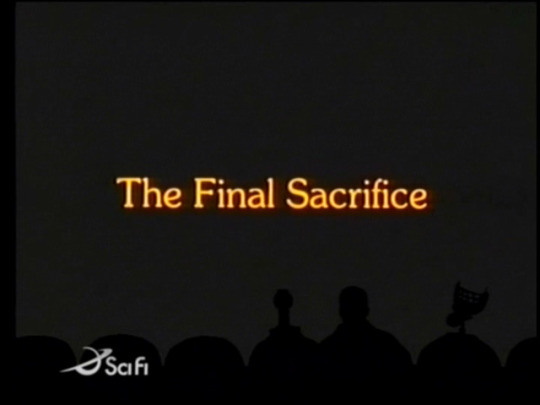
910: The Final Sacrifice
I grew up in Calgary, which means that the riff about Edmonton being kind of like hell but less so is at least six times funnier than it would be otherwise. My sister did her IT degree at the same school (the Southern Alberta Institute of Technology) as the people in this movie were taking their film classes. I’ve probably been to places where they shot scenes and didn’t know it… all of which makes The Final Sacrifice particularly dear to my heart, even by MSTie standards.
Seven years ago, young Troy’s father was chased down and murdered by armed luchadors in the woods somewhere. Now, grown into a man of at least twelve, Troy is determined to find the killers. In an attic he discovers a mysterious map and a bunch of information about the ‘Ziox’, but before he can puzzle it out the luchadors attack! Troy escapes by climbing into a truck driven by Canada’s second-greatest hero (after Wolverine), the one, the only Zap Rowsdower. Together, the two of them set out to conquer Zap Rowsdower’s car trouble and uncover the secret of the Ziox, a lost civilization that once ruled the land of Fish Creek Provincial Park!
First, some Canadiana. The Lemon Mine is a legendary lost gold deposit supposedly found by prospector John Lemon. Also, Maple Syrup Rustling is a thing that goes on in Canada. Over the winter of 2011-2012, nearly three thousand tonnes of it were stolen from the Federation of Quebec Maple Syrup Producers, one barrel at a time. Canadians regard this in the same way as other countries might think of big art or bank heists, with the perpetrators becoming folk-culture heroes. Also also, Brain Guy was wrong. The worst thing ever to come out of Canada is, hands down, our geese, which attack livestock, destroy aircraft, and don’t even taste good. They are the worst of all birds and we apologize.
Second, some racism. According to the movie, the Ziox were a lost civilization who lived in Southern Alberta eleventy thousand years ago, “way before the Indians” and built cities of gold in the middle of the prairie. Since Sartoris and Zap Rowsdower, among others, are descendants of these people it appears they were supposed to be white. Because there’s no way anybody who wasn’t white could have built huge cities full of golden pyramids, right? It’s not like there were entire cultures in the Americas who were known for exactly that!
Those peoples didn’t live in southern Alberta, though, for the excellent reason that there’s nothing here. This area is miles upon miles of rolling grassland, from the foot of the mountains all the way to Manitoba, with not much in it but buffalo and buffalo by-products. There’s some sandstone you can build quaint town halls with, but not pyramids that will last thousands of years. The wildlife aren’t suitable for domestication. There’s no meaningful amount of gold. There weren’t even very many trees until Europeans started planting them as windbreaks. For as long as there’s an archaeological record, the indigenous peoples around here have been nomadic hunters. Permanent settlements couldn’t get started until the railway arrived to bring in supplies.
On to the movie. When you want to tell a big story but have only a little budget, one popular way to do it is by having most of your adventure happen in the middle of nowhere so you can save your money to make a big impression in only a few key scenes. Take, for example, The Princess Bride, which is mostly just a few people in the wilderness but put enough into the palace sequences to make us believe we were in a Renaissance-era world. The Final Sacrifice is a stellar example of a film that’s too damn cheap to even get away with that. They wanted demonic idols and spectacular caverns and an ancient city rising from the earth but all they got is a bunch of toothpick models and papier-mache, almost as pathetic as the dinosaur puppets in Future War.
The nail in the coffin is that The Final Sacrifice can’t even do wilderness very well. The outdoor scenes are in very open scrub, which are rather desolate but don't give the impression of somewhere miles from civilization. It looks, like I already observed, a lot like Fish Creek Park, which is about a twenty-minute walk from where I grew up and sees a steady stream of picnickers and brownie troops all summer. Any given shot in The Final Sacrifice looks like if you moved the camera three inches to one side you’d see a bunch of little kids making s’mores.
I’m pretty sure the writers originally had something much grander in mind, and had to tone it down a lot to get it to the screen with the money they had – because when you think about it, it’s obvious that The Final Sacrifice is a story about the lost continent of Atlantis. You’ve got an ancient advanced civilization that was punished for its hubris and blasphemy by sinking, and which promises untold power and wealth to whoever can find its remains. That’s a tale that ought to span continents, with adventurous archaeologists and deserted isles and plane crashes and such things… but all anybody had was a small town and some back woods a few hours’ drive out of Calgary, so they had to make do. The result feels like a story trying to be bigger than it is, as if the events in the movie only think they ought to have world-shaking implications but actually don’t matter to anyone.
Adding to the impression that there’s something missing from this movie, the story depends an awful lot on some very odd coincidences. I can buy that Troy lives only a couple hours’ drive from the site of the Ziox city – that’s where his father lived and worked, and since Troy’s aunt didn’t know about the cultists there was no reason for her to move. But then the truck he climbs into just happens to belong to a former member of the cult? Zap Rowsdower is supposed to be an alcoholic drifter who just wants to get away and forget, so why the heck is he still in the area? Canada is big. Go to Halifax. Go to Resolute Bay. Hell, leave the country. Why stick around within a few miles of the evil cult that threw you out?
Then there’s Pipper. He’s been hiding from the cult for years, he says, but he’s doing it in a cabin about ten meters (that's thirty-five feet for the Americans in the audience) from the site of the idol! That might make sense if he were guarding it, but he doesn’t know it’s nearby and professes to believe it’s just a legend. So what is he doing there? Movie audiences can handle magic and aliens and all kinds of other ridiculous things, but too many coincidences will kill suspension of disbelief in a way the overtly fantastical never can.
When you want to tell a big story in your movie, it’s also helpful if the audience knows what the characters want and what will happen if they fail. On the first count, I guess The Final Sacrifice does okay. We do know that Troy wants to find out why his father died and what’s up with all this stuff he left behind, and Zap Rowsdower just wants to get away from this distasteful part of his past but is sucked back into it by Troy whether he likes it or not. On what will happen if they fail, however, the film is much less clear. Sartoris talks about raising an army of invincible warriors and conquering the world, but it’s not clear how making a sacrifice to the idol in the woods will bring that about. Does Sartoris believe the city will arise full of undead soldiers or something? The only version of the associated legends we get comes from Pipper, who says nothing about any such thing. We’re obviously meant to believe that at least some of the population escaped the sinking, since they had to go give rise to descendants like Zap Rowsdower and the luchadors.
The ending is clearly supposed to be ironic, as it is Sartoris’ death that satisfies the idol and raises the city from the ground. This would have been more effective if Sartoris himself had lived long enough to appreciate the irony, but that much works well enough. The rest of the events at the end of the film just leave way too many questions. What happened to all the luchadors? They pull off their masks and walk into the light and out of the movie. Why did Zap Rowsdower’s tattoo disappear? Does Sartoris actually have some kind of magical powers, since he seems able to telepathically contact Zap Roswdower in his sleep? Did the city actually blast off into space, possibly taking the luchadors with it? Because there are definitely shots that make it look like that’s happening. What’s going on there?

Honestly, that’s not a bad explanation. Throwing some Erich Von Daniken, Pumaman or Hangar 18 bullshit into this would actually have made way more sense. Wow, is that ever sad.
It’s easy to be really hard on The Final Sacrifice because it is so very cheap, but on the other hand it was literally made by first-year students at a polytechnic not known for producing filmmakers. When you think of it that way, it actually looks surprisingly like a real movie… but still not enough that it should ever have been released into the wild. The fact that Tjardus Greidanus’ imagination was so much bigger than his budget makes it seem like he had some honest potential. He’s still making both narrative and documentary films, and I’m kind of interested to see some of them.
63 notes
·
View notes